#a lot of the time the characters speak during frame transitions
Text
Hazbin Episode 2 Review
As usual, here is the swear count:
Fuck - 25
Shit - 9
Bitch/ Hoe/ Whore/ Slut/ Bimbo - 12
Damn - 1
Ass - 1
Cock/Dick - 1
Porn/Sex - 1
Tits/Boobs - 0
Pussy/Vagina/ Cunt - 0
Piss - 2
Now onto spoilers under the break!
The Good:
We got a lot more Alastor this episode and I love him so much. Getting to see how he uses his dark magic, completely wiping the floor with Pentius and not even paying him the time of day to acknowledge him. Alastor’s cruel side coming out on display as he toys with Pentius before ultimately tossing him away like nothing. Really helped show that Alastor has that power like none other, like we saw in the pilot.
One thing I especially love about the scenes of Alastor and Pentius is how petty Alastor can get. How even the smallest rip of his suit coat got him so mad he let out a deer noise (which I think was a neat touch.)
This episode ultimately is just an introduction to the V’s but Alastor steals the spotlight. How you really can tell that he hates the V’s, and especially Vox.
Speaking of who had hypnotic powers (and so does Pentius seemingly) and it would be interesting to explore that more.
Ultimately you really get the sense that the V’s are the outcasts of the Overlords because they’re just total jerks all together, and not so much that they’re powerful like Alastor is. Also Status Quo had a good song transition both start and finish and is a pretty alright song.
Seeing how creepy Alastor got at the end was also a blessing.
Other than that?
I still love Nifty and how she got upset at Pentius trying to be a better person and also we got to see Fat Nuggets. So hurray!
Okay now onto
The Bad:
The overall pacing of this episode was kinda weird? Like it starts off with Pentius, then moves onto the V’s, and then back to Pentius and for the V introduction episode, it felt like that they didn’t get much screen time.
A few minutes on their own, Velvette barely getting any, Val being there only like 3 times, and Vox basically gets his butt kicked around by Alastor without much tension.
I really do wish that there was more of a power balance thing going on and I know that’s kinda weird to say given how Helluva arguably was pretty forward on the pecking order. Imagine three Overlords all having powers near equal to Alastor, that would raise the stakes as it leaves Charlie and Alastor basically being the two between the V’s and the destruction of the hotel.
Ultimately the V’s feel like Overlords only by title and not by actuality. The bark is there but no bite.
As for Pentius? Meh. His little story was alright I guess, but ultimately it more served as a way to start up Angel character development. I know I’ve thrown around the term “- is the Jaune Arc of this show” before and I want to explain that.
You know how James Gunn made Rocket the secret protagonist of the Guardian films? Take that idea and make it bad and add in a dash of misogyny if called for.
I am deeply afraid that Angel will be taking up more screen time than Charlie and will ultimately take over her spot as the protagonist. Which begs the question, why wasn’t Angel just made the protagonist up right?
Charlie is being woobified as is the case with most Viv characters, and now Angel’s focus is increasing. I got the same vibe from Fizz taking the protagonist role from Bitzø in Helluva.
Other than that? It becomes very apparent that this episode was written by Viv given the 25 fucks said during this episode, the most this far in the series. (Spoilers: E4 takes the cake for the most with 35.) Most of those fucks are spoken by Val’s brief first appearance before Status Quo. To call it excessive would be accurate.
Also let me not forget that I only count the spoken swears, and not the ones only shown. If I did, 25 would have become 30 in one frame during Vox’s news segment during the song.
Also during said segment, there is another Blitzø style drawing, which might only be irking me and no one else.
As for the song itself? I think the only downsides would be that Alastor singing about how older technology and ways of doing things are better than the new, uses terms such as “clout”, “podcast”, and “that’s the tea.”
Is this a nitpick? Sure. Does it only slightly exist out of the reasonability of Alastor’s character and how he acts and thinks? Sure. Does it still bother me like mad and make me point to it as a casual example of Viv not really knowing what she is doing with characters? Yes.
So ultimately this episode was like a 5/10. Idk, it exists I guess.
#doom.txt#hazbin hotel#hazbin hotel critical#hazbin spoilers#hazbin hotel critique#hazbin hotel spoilers
24 notes
·
View notes
Text
Pokemon Violet - Initial Thoughts
Just started playing Pokemon Violet; I was always planning on picking it up in the first place despite not pre-ordering. All the talk of its apparently glitchy nature was disheartening, but I wanted to give it a fair shake all the same. A lot of the time such reports get overblown, after all. I've seen people shriek about a game being unplayable if it drops from 60 frames per second to 59 in a heavy load zone, after all.
That said? After going in with simultaneously low expectations and a giving it a lot of slack?
I'd consider what I've seen so far to be a genuinely impressive feat for an amateur game dev's tech demo. But for a full release? Let alone from a major studio with as much weight behind it as the Pokemon franchise carries? This game is embarrassingly bad.
Literally the very first second of game play and there's a major graphical glitch. The game opens showing off the fancy academy your character will be attending, but it loads in a low-rez stand-in model that snaps into the high-rez version full on screen. During the opening cut scene, characters blink into T-Poses as they load in and out.
As I walked my character out of their bedroom at the very beginning of actual controllable gameplay, the camera glitched and got stuck inside a wall, resulting in a total black-out screen that made me think my system had crashed. The colors of your character's hair, skin, and make-up don't match between the menu screen where you select them and how they're displayed in the overworld's lighting. Said lighting also flickers around or changes entirely full on-screen with no transitions, jolting from one lighting set to another before the scene it's required for actually loads in. Textures out in the world - signs, terrain, the environment in general - are pixelated and blurry to the point of being distorted blobs. The frame rate is absolutely appalling, dropping and lagging down wildly for seemingly no reason, sometimes going as low as less than 10 frames per second. As I have my character walking around in their homeroom, the seated classmates and the books on their desk flicker rapidly into the floor and back up again. NPCs blink in and out of existence where they stand, or walk in jerky 3 frames per second flip book animations. Even as my own Player model is moving smoothly and without any visual issues in the same rendered scene. I'm honestly not even sure how the code could even make that happen; it'd be one thing if everyone in the room was moving in the same jarring, jerky way, but two or three characters are moving normally while the rest are jittering around.
When you go into shops to try on various clothing items, it takes about 10 seconds for your character model to load in and several more seconds to switch between clothing item previews. Even if the only difference is just a color swap. Keep in mind that this was instantaneous in previous games, including games back on the 3DS. If your hair style isn't compatible with hats, your character model just won't show up at all and you can't preview the item whatsoever. As you leave the shop, the character model is loaded in off the ground and jitter-pops into existence with a short drop.
Out in the overworld, different models load in at different distances from the Player and animate at different frame rates. For example, as I walk down the road just outside my house, NPCs load in (a low-poly stand-in version first that snaps into a higher-rez version with no smooth transition) after bushes do, but before trees (which also have the same jerky low-poly to high-poly snap transition). As I walk around, the game chugs down to a crawl at random, often requiring me to reset it entirely. I speak to a NPC out in the field and my game freezes, only to not freeze a second time after I restart the game and talk to them again. When you call out your partner Pokemon into the field to act solo (a core selling point of this game), there's no summoning animation or effects; they just abruptly pop into existence, which is doubly weird because there is both an animation and effect for when they return to their Pokeball or if you call them over from a distance. When I get into battles and there's a third character on the sidelines, the game camera gets stuck on them as it swings to and fro, resulting in the view spiraling wildly out of control for a few seconds. The camera glitches into the terrain seemingly at random or gets caught at weird angles, resulting in constant screen-blocking closeups of my Pokemon's back, or ignoring Player inputs to try and move the camera around.
This game is atrociously bad. I mean, holy shit, the problems it has are basic, fundamental flaws that NEVER should have made it past quality control in the first place. Things that are just basics in regards to coding and design. Especially when considering that earlier Pokemon titles on the Switch hardware (Sword/Shield and Pokemon Arceus) ran just fine by comparison. Previous generations on the 3DS are more stable and better performing than this.
And this is just the basic mechanics in the immediate starting area of the game. I haven't even gotten into design part of the game play experience. That's a whole other kettle of fish and its own post.
#pokemon#pokemon violet#scarlet and violet#nintendo#game freak#seriously game freak - get your shit together this is embarrassing
6 notes
·
View notes
Text
youtube
The Hero and the Crown by Robin McKinley
1985 Newbery Medal Winner
Adapted by Lily Manning (2024)
From Chicago, IL
Judges' Remarks: Lily Manning is back with her ultimate stop-motion movie for the 90-Second Newbery, and man it's a doozy! I've had the pleasure of watching Lily's craft develop, from her first stop-motion movie of My Father's Dragon, advancing into Along Came A Dog, reaching new levels in Shadow of a Bull, and culminating in this final masterpiece. I love that Lily's movies are always of lesser-known, underappreciated Newbery winners. The Hero and the Crown is a great high fantasy novel, a little bit forgotten today, but it's one of the first to feature a strong female protagonist. I loved the smooth, fluid animation throughout this movie: Lily told me that this movie was shot in 24 frames per second, making over 7000 shots for the entire movie, and I'm staggered by her craftsmanship and dedication! The elaborate sets are full of life and detail, often crowded with moving characters and creatures and knickknacks: Aerin's potion workroom, the royal ball, various forests and battlefields, Luthe's sorceror's hideaway, and more. The nimble cinematography always guides the eye to the most important details so that the viewer is never lost, panning and zooming, and with a variety of shots: establishing shots, intense closeups, representing not only big vistas but also intimate moments. I'm particularly impressed at how the camera is often moving even as the characters are moving at the same time, such as when the attendees at the ball are all dancing and swooping around as the camera moves, or the simultaneous camera/character movement in the climactic battle. (So many great battles: Aerin vs. the small dragon, Aerin vs. the big dragon, Aerin vs. the uncle, and the big final battle at the end!) One of the things that makes this movie feels so alive is that, at the start of many of the scenes, the characters are often already doing something before the real action of the scene begins: for instance, the king is reading a document with a magnifiying class when Aerin bursts into the throne room with the guards, or the sorceror Luthe is feeding some rabbits when Aerin shows up at his cottage, or we begin a scene by focusing on the movements of chickens and other barnyard animals frisking about, and then pull back to reveal a panoramic scene in which the soldiers are mustering to go off to war. That is: nobody is ever just sitting around waiting for the scene to begin, all the characters seem to have their own lives going on independent of the story, and that makes the characters and their world feel that much more real! The voiceover performances crackled with life and authenticity, and it's a credit to both the performers and the cinematography that we always know which character is speaking, even those the action figures don't have moving mouths. Even though the movie is nine minutes long, it never feels like it lags, and the script has touches of wit ("Your mother died of despair when you were a girl. She was a bit old-fashioned") and also lots of genuine emotion—I totally bought the depth of Aerin and Tor's romance, and the final dialogue between them was emotionally believable. The background music was also really well done, often changing to match the action onscreen, such as during the fight scene between Aerin and her uncle. There were so many great little touches, all of which combined to make the movie feel convincingly real: the shadow of the big dragon passing overhead just before Aerin fights it, the way Aerin makes her bed after she wakes up in Luthe's house, the explosion (resourcefully represented by crumpled paper) when Aerin defeats her uncle, or the stylishly cinematic transition between Aerin's delirious wanderings and Luthe's cottage. This movie is an all-time great for the film festival, and an astonishing capstone to an impressive 90-Second Newbery career! Stunning work!
Permalink
1 note
·
View note
Text
absolutely obsessed with laszlo in this episode
#tw for neck snapping two thirds of the way in. if you don't want to see that lol#wwdits#wwdits fx#wwdits spoilers#what we do in the shadows#laszlo#laszlo cravensworth#video#sorry the cuts are kinda weird i did my best#a lot of the time the characters speak during frame transitions#and it'd sound weird to cut out parts of the words#i would upload the whole episode here if i could lol it was so good
805 notes
·
View notes
Text
Why Naoto is Heavily Trans Coded, and How The Discussion Surrounding Him Needs to Change
Hello, I’ve never written or posted anything like this before LOL so this is a bit daunting. But this subject is something that’s been bothering me for a long time, and I wanted to get it out somewhere. So let’s talk about how Naoto Shirogane is heavily trans coded, and how the fandom has a problematic culture surrounding the issue that really needs to change.
Tw // discussion of misogyny , transphobia , and mentions of harassment

Initial Shadow Confrontation
Since the discussion is most often about what’s “canon” and what’s not, let’s first take a look at what the game actually does give us about Naoto’s character. During the confrontation with Naoto’s shadow, we learn that Naoto idolized detectives as a kid, and wanted to be one himself when he was older.
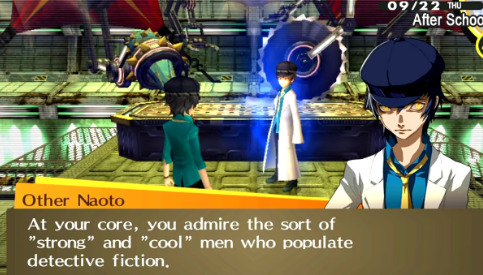
However, this posed a problem for him in multiple ways. One, he was (is) still a child, and the people in his field don’t take him seriously because of it. He tries desperately to escape this fact, to try and act as mature as possible, but ultimately he can’t change how others will perceive him at his age.

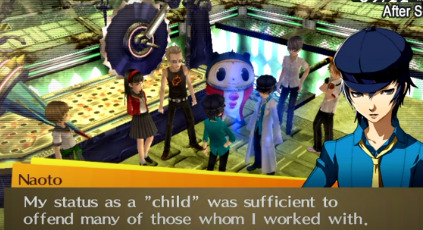
This is what the shadow confrontation focuses on most heavily. But then it switches to discussing the other part of the issue-- the fact that Naoto’s ideal image of a detective is a man, and he “isn’t.”
At the end, Yukiko says “You must know already that what you yearn for isn’t to become an adult or to become a boy,” and Naoto accepts it. This is what most people point to when saying that Naoto can’t be trans, because he agrees that it wasn’t what he wished for. So, easy, right? If you take this as him telling the truth, then it looks like an open and shut case-- he isn’t trans. But Naoto’s actions don’t really fit what he says here.
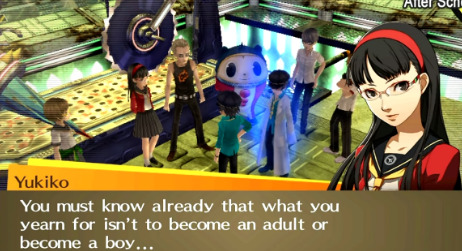
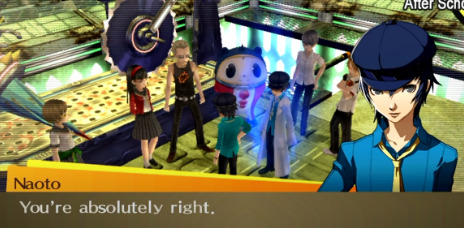
The issue starts with these next lines (below) in particular. To me, Naoto’s tone in the first line is regretful, and doesn’t strike me as a sentiment someone who is cisgender would necessarily hold. Why would he want to “change into a man?” To fit his ideal image of a detective? As he says here, yes.
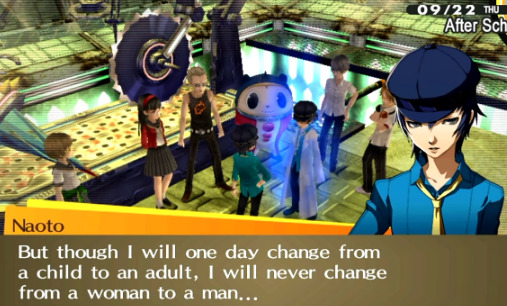
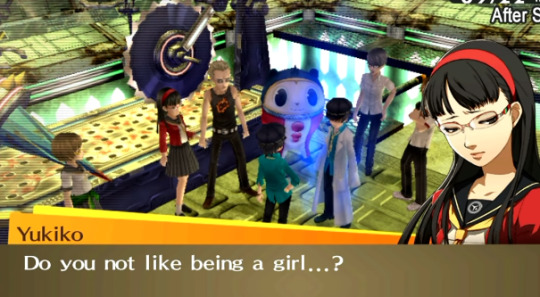
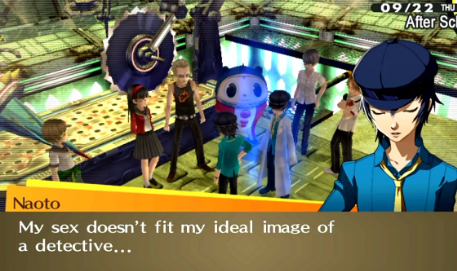
(Real quick before I continue, it’s not clear in the dialogue screenshot but it’s important to note that Naoto does say “yes” to Yukiko’s question about him not liking being a girl. He nods his head)
The narrative that the game tries to go with after this is that the “ideal image” Naoto wanted to live up to, including the male aspect of it, was unattainable and formed primarily because he felt that was the only way he could be a detective.
But, is this really that much of a problem? We all look up to certain types of people, people that we want to be like-- and for many, this can factor into gender identity as well. If Naoto really just wanted to be a cool, male detective, that doesn’t at all negate that being trans would be a part of that for him.
Naoto’s other words and actions, as well as the framing of this scene as a whole, make the scenario feel a lot less believable to me for multiple reasons. Naoto never initiates the conversation that him wanting to be a boy is incorrect-- Yukiko does. Naoto isn’t even the one to trigger his shadow-- Kanji does that. Naoto had a lot less agency in a lot of these decisions than the other characters did with their shadows.
Naoto’s Continued Actions
The fragility of the narrative Atlus put together for Naoto continues to grow throughout the rest of the game, due to the way he behaves after the initial shadow confrontation.
For starters, it’s implied that Naoto is not his birth name, something that i think a lot of people either miss or forget about-- and yet he continues to go by it throughout the course of the game. We never find out his deadname and he never expresses a desire to share it with anybody.
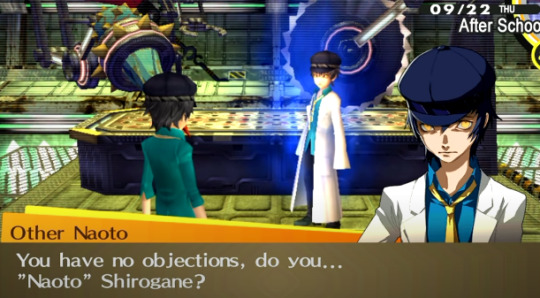
The day after the “reveal,” Naoto doesn’t change anything about his appearance, mannerisms, or how he presents himself. He honestly seems uncomfortable with the fact that everyone has found out, in a way that felt much like being outed to the whole school, as opposed to finally being seen and accepted for who you “really” are.
I understand that such a drastic shift in people’s perception of you would be overwhelming to anybody, no matter if you were cis or not. But if Atlus really wanted to hone in on the idea that Naoto was happy about this change, they could’ve at least made him…. Well, happy about it. Even if it was just a small smile, just a tiny indication of relief even despite how hard it will be to adjust, it would’ve made it at least a little more believable that this is what he really wanted.
But that’s not the case. Instead, he’s uncomfortable, he still binds, he still wears the school’s male uniform, and he still goes by Naoto. The only time any of this actually changes is if you as the protagonist push him to, which… is a whole other mess.
The fact that Naoto has even gotten to this point, though, speaks more volumes to me than anything else. Passing is not easy. Coming out is not easy. Naoto would have had to go through difficult lengths in order to get not only his school, but the country and media to see him as a man. He’s a well-known "detective prince".. someone was bound to look up his records and find out about it. That's a huge risk to take.
In addition to this, he binds. He goes by masculine pronouns and a masculine name. He very audibly changes his voice to be more masculine. I don’t know how to tell you this, but this is just…. not something cis people do? At least not comfortably.
In fact, doing all of this would have been incredibly uncomfortable for Naoto if he was cis. As someone who experiences dysphoria, looking like and being seen as a gender you are not can be really, really painful. If transitioning was something he really didn’t want, why would he put himself through all of that? Was it really to escape misogyny? Me asking this isn’t minimizing the issue at all, because I understand that it’s incredibly serious and hard for countless women. But I would generally think someone’s first reaction to facing misogyny isn’t to… completely change their identity and present as a different gender.
On top of being probably the hardest option of escaping misogyny available to him, and one of the most uncomfortable, presenting as a man doesn’t necessarily get rid of any prejudices Naoto may face. In fact, I would argue that it’s considerably more dangerous. Especially in a rural town like Inaba, where people seem to not really understand or approve of being LGBT. Naoto is smart, he would have thought of all of this. So why?
Inherent Transphobia of Naoto’s Arc
There is something to be said about how much misogyny is present in Japan’s workforce, especially in fields like Naoto’s, and the importance there is in discussing that. The base idea behind his struggles and message isn’t inherently a bad one, but the way the game went about it was problematic because it put down transgender identities in the process.
The first time I watched Naoto’s shadow confrontation, it was really distressing to me. The game continuously repeats the idea that you can’t “cross the barrier of the sexes,” that Naoto “can never really be a man,” and that “you can change your name, but you can never change who you “really” are.” I hope I don’t need to explain why this is a problem.
Naoto’s wish to be a man, regardless of what was driving it, is depicted as something temporary and childish. Something that Naoto “didn’t really want,” something that was just an excuse to run away from the misogyny he was facing. Even if it was unintentional, this message is incredibly harmful to transgender people.
It would have been a better and much more coherent message about misogyny if the writers had steered clear of trans themes entirely. In fact, I think they did so well with Sae’s character in Persona 5-- she’s in the same field of work, facing very similar struggles, but she doesn’t react in the same way as Naoto at all.
Kanji and Homophobia
It’s even worse that Naoto’s “reveal,” on top of being problematic by itself, is used as a method to bury Kanji’s exploration of his own sexuality. The problems with Kanji’s own shadow are bad enough to warrant their own long rant, but the reveal that Naoto was “really a girl” this whole time allows the story to completely wave off his gayness for good.
This isn’t something unique to this game-- the trope of “two boys fall in love, but one of them turns out to be a girl so it’s fine” has been used numerous times in other media to explore the topic half-assedly. It plays with the “exoticness” or “drama” of a gay romance, but backs off at the end in order to uphold societal norms and prevent backlash.
This doesn’t really give any kind of good commentary on gay relationships, nor does it depict them in a positive or helpful manner. It isn’t something that these games should be getting kudos for doing.
Misogyny?
I think there’s also something to be said about how poignantly bad Atlus is at really tackling the problem of misogyny. It tries, especially with characters like Ann and Sae, and in certain aspects it can succeed. But then they have scenes like the pageant and Every Beach Scene Ever, where the women are forced to wear swimsuits or revealing clothing against their will, or their bodies are talked about without their consent. There is consistently a character in each persona game who is forced to do the whole misogynistic dipshit gimmick that’s supposed to be funny-- Junpei, Yosuke, Teddie, Morgana, Ryuji-- and while this is obviously not a Persona specific problem by a longshot, it’s still indicative of how unsuccessful these games often are in delivering the message that society’s systemic misogyny is an issue.
This is something I think about a lot when people try and argue that Naoto’s story can’t be about him being trans because it’s “an important message about misogyny.” Atlus often doesn’t deliver on such stories already, and they certainly didn’t with Naoto. As soon as Naoto returns to “living as a woman” he’s subjected to the same misogyny that the other girls are. His chest is commented on, he’s forced to be in the beauty pageant, he’s made uncomfortable in the bath scenes-- really, all Atlus did after the reveal was make the problem worse for him.
On top of this, his story never actually meaningfully tackles the problem of misogyny in the detective force. It’s not a major part of his social link or the general plot of the game-- honestly, it’s barely even touched on at all after the initial confrontation. Thus, the idea that “Naoto can’t be trans because it erases a story about misogyny” is just plain untrue. There never was a coherent one in the first place.
Problems Within the Fandom
Despite all of this, there is such an intense backlash from the majority of the fandom if anybody dares to bring up these issues with Naoto’s story. Naoto being trans is generally seen as something ridiculous and stupid, or something to insult and mock people for.
I understand that there's always going to be people who say provocative stuff like this, no matter what anyone does, and that it’s not something exclusive to this particular fandom or character. But the problem is that this rhetoric isn't just from them anymore--the consensus among so much of the fandom seems to be either that Naoto absolutely cannot be trans, or that speaking about it at all is "annoying discourse" and taboo. Even from fans that are LGBT or allies themselves.
This in and of itself is such a telling thing to me. if you find yourself getting angry about the subject, really ask yourself why. Is it such a problem for people to reclaim a transphobic story? Is it such a problem for a character to be trans in the first place? There is room for discussion and nuance regarding this situation, but we have to make it for ourselves. We can accept that Atlus’s base game will never actually give us a coherent story about either misogyny nor being transgender with Naoto’s story. But petty arguments and insults thrown at people who bring up this topic isn’t any of that-- it’s just poorly masked transphobia.
So at the end of the day, no, Naoto being is trans is not “canon.” Of course Naoto would not actually be allowed to be trans, he is a main character in a game series where the only explicitly LGBT characters have been consistently buried, stereotyped, or demonized with only a few rare exceptions.
Yes, you’re allowed to headcanon whatever you want about him. I can’t stop you from wanting a story about misogyny, or from seeing Naoto’s gender as something more fluid than I do. But you can’t ignore the fact that his story, as written in canon, is laden with transphobia despite its intentions. It’s not a ridiculous or harmful thing for trans people to want to reclaim that.
There are still a lot more issues with how Naoto is treated in the game-- especially in his romance route-- but that’s a whole other can of worms I’m not ready to unpack today lol
Hopefully all of this made sense though, and feel free to bring up anything else I may have missed or point out any issues you might have with it :-) Thanks for reading!
#persona 4#naoto shirogane#p4#persona#naoto#trans naoto#meta#long post#discourse#misogyny#transphobia#god?? god!! help me#this is literally such a mess lol But#sorry for lack of pictures in the second half also
195 notes
·
View notes
Text
Wuko in the Comics: Ruins of the Empire: Book 1, Part 1
Welcome to my second post on Wuko in the comics. In this post I’ll be discussing the first half of Ruins of the Empire: Book 1. Wu is a prominent character in this comic trilogy, and there is lots of character development and exploration for him. There are also a lot of scenes with Wu and Mako together, and what’s more, there are a handful of visual parallels to Korrasami!
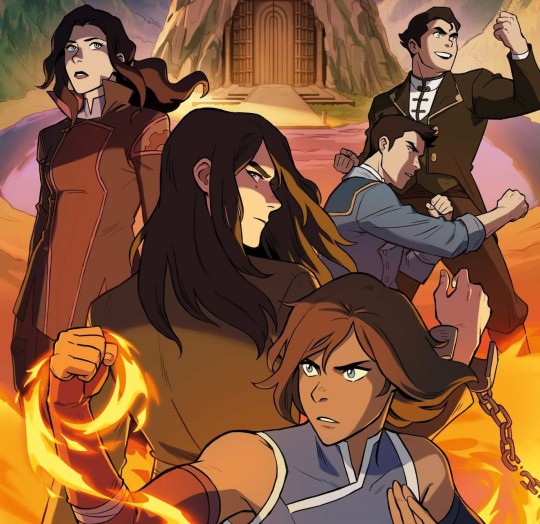
Ruins of the Empire
Book 1 of RotE was released in May 2019. The art style is different from Turf Wars- the colors are very vibrant and it almost looks like stills of the animated series. It takes place 3 months after the conclusion of the animated series, and there is lots of continuity following the events of Turf wars. Some major plot points that carry from Turf Wars include: Wu has been governing the Earth Kingdom, Korra and Asami are in a firmly established relationship, and Zhu Li is President of the United Nations.
Plot Summary
The first half of Book 1 of RotE highlights the transition of the Earth Kingdom into a democracy by focusing on the first state to hold its elections, Gaoling. Gaoling’s election is at risk of being disrupted by Earth Empire general, Guan, who didn’t surrender when the rest of the empire did. The Krew decides to accompany King Wu to Gaoling to ensure the election proceeds without interference.
Major plot points in the first half of Book 1
We start out with a flashback that sets the timeline for the rest of the comic. In Gaoling, Commander Guan is running an earth empire “reeducation camp” and has just gotten word that Kuvira surrendered, but isn’t planning to give up so easily. He insists that his “experiments” and the Earth Empire will go on, with or without Kuvira as the Earth Emperor…. Then we jump ahead 3 months to Republic City, City Hall. We start out with an excellent frame, the first of many Wuko Korrasami parallels! Get excited, there are SO many!
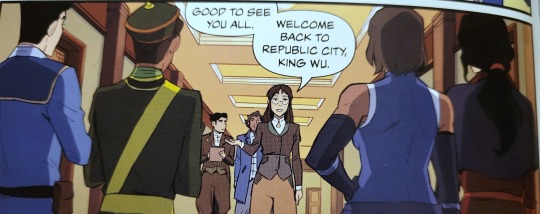
Bolin is working for President Zhu Li Moon now, because, why not? He just quit his job working with Mako on the police force, and now he’s Zhu Li’s administrative assistant or something. Zhu Li is going to be introducing King Wu for a “big speech” to the citizens of Republic City. Korra gives Wu a friendly elbow nudge and asks if he’s ready. (the first of many wholesome friendship moments between the two of them)
Wu is not ready, he’s nervous. He asks Mako to read his speech for him, and Mako says no way- but then he reassures Wu that he’ll do great. “Just be yourself” Wu is immediately comforted and says that Mako always knows the right thing to say and that must be why he keeps Mako around! (I can think of a couple other reasons...) Mako’s expressions are very stoic and closed off. He’s got his arms crossed and looks grumpy (I feel like I’m always saying Mako looks grumpy. But that’s the best adjective I can come up with).
Wu begins his speech where he announces that it’s almost time for the Earth Kingdom states to begin holding elections, starting in the state of Gaoling. Grandma Yin and cousin Tu are in the audience and Yin is booing Wu, and also yelling “Long live the monarchy” while holding framed portraits of Wu and Hou-Ting.
Asami, Korra, Mako and Varric are standing behind Wu, applauding along with the crowd (well, the crowd minus Yin). Korra and Mako casually compliment Wu, saying that he's doing great and almost looks like a real leader! Wu says that within a year there will be a peaceful transition to democracy. He gets bombarded by questions and panics and starts singing. He tosses his stylish hat into the crowd, which Yin catches and says “you’ll always be my king!” Mako covers his face with his hands, Korra says ”well you did tell him to be himself” and Mako says “this is NOT what I meant”. Sorry Mako. You know Wu better than anyone so you should have known a song was coming. Zhu Li takes the podium and Wu dramatically faints/collapses into Mako’s arms. I presume on purpose.
We cut to a scene of Kuvira’s trial. Kuvira, after being read the charges against her, pleads not guilty (because every thing she did was for the “greater good”), Suyin confronts her and Kuvira apologizes but Suyin isn’t having it and forcefully tells her that apologies aren’t enough, she has to take responsibility.
We move on to President Moon’s office, where Wu is sitting on a sofa and Bolin welcomes Asami, Mako and Korra in. Mako lampshades Bolin’s many career changes. Bolin makes a comment to Mako that just because Mako has “found” himself it doesn’t mean the rest of them have. I, for the life of me, can’t figure out exactly what Bolin is trying to say here. Is he referring to the fact that Mako has “found” his career as a detective? Or something else, like his true feelings for Wu? Probably the first thing but us Wuko shippers will happily apply it to the other thing.
Once everyone is settled in, Wu asks them to come with him to Gaoling for the upcoming elections! Mako is actually not thrilled, and tells Wu that they aren’t going to be there for him to show off as his entourage. Wu is like No, that’s not it! Well, yes, kinda. He wants their help dealing with the Earth Empire loyalists being led by Guan. The Earth Kingdom army is understaffed and Wu is worried the Guan will try to prevent the elections from happening. The Krew agrees that it could be a problem, especially since it could cause other states to back out of holding elections and allow the earth empire to rise again.
So the Krew plans to come to Gaoling to show support for the elections, hopefully deter Guan from interfering, and Mako says they will keep Wu safe. Zhu Li encourages Bolin to go as well. Wu is very excited to team up with Mako again! After they leave the President's office, Korra suggests going to go speak to Kuvira to try to gather intel on Guan- Asami is not thrilled and doesn’t want to go with her because Kuvira was responsible for her father’s death. Korra is understanding and supportive and they share a lovely little kiss before Korra heads off.
Korra arrives at Kuvira’s prison with Naga. We catch a quick glimpse into Kuvira’s mind as she remembers a moment from her childhood when she ran away from her parents-after her parents accused her of breaking a vase, the take away her toys and lock her in her room “for her own good”, and she uses her earth bending to break the wall and escape. This and other flashbacks attempt to make us more sympathetic to Kuvira so we can accept her redemption arc in the remainder of the comics. After her little flashback, Korra and Kuvira discuss Guan. Kuvira says she didn’t know Guan hadn’t surrendered, and that Korra should consider him a major threat because he is cunning and strategic. Then Kuvira tells Korra if she wants to stop Guan, she should bring Kuvira along to reason with him and convince him to stand down and surrender. Korra is not convinced, but Kuvira tells her to take time to think about it, and she’ll be there to help when Korra asks.
Meanwhile, Guan is rallying his troops. He’s got a sizable regiment of soldiers along with tanks, and is giving them a big speech about taking back the empire and rising from the ruins of defeat. He and his troops head out of their fortress, presumably to do exactly what everyone is worried about and stop Gaoling’s election.
Mako and Wu Scenes
Mako and Wu are featured in many scenes of these comics, together more often than not!
The very first scene with Wu, he is standing right next to Mako, in the same frame as Korra and Asami. I realize “standing next to each other” might not actually be ground breaking evidence for Wuko, but it feels like a parallel to Korrasami, and most importantly creates kind of an establishing shot, planting Wu at the center along with Korra. This is kind of amazing considering he was in only one season of the show and he was largely a comic relief character that I don’t think the writers meant for us to take seriously. There is a pattern of parallels in RotE with Korrasami and Wuko, and we don’t really need to reach for them. They are right there, visually.
We also get to see some lovely moments of Korra’s and Wu’s friendship. She elbows him good-naturedly. She’s kind and supportive. She compliments him. He does seem a little awkward but overall it seems he really fits in with the Krew now, and I find it really sweet. His characterization feels very different from the show. He isn’t obnoxiously flirting with every 'dame' he lays eyes on. He isn’t bratty, or materialistic. He’s still goofy and lands some comic relief joke moments, but overall he is treated like an actual character with substantial development and plot-advancing roles.
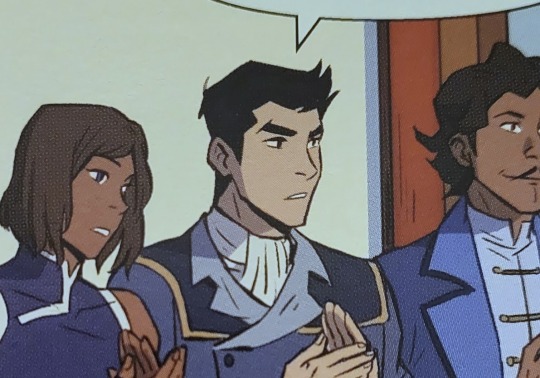
During Wu’s speech, Mako is staring like, way too intently at him while casually complementing how he almost looks like a real leader. (Well, up until Wu starts singing, and then his second-hand embarrassment seems more intense than the others, who mostly just seem a little stunned, while Mako has his face buried in his hands). Also, the running gag of Grandma Yin being obsessed with royalty has it’s funny moments during his speech, but I really like it because the fact that Mako’s grandma is reverent, affectionate, AND outspoken with Wu would probably create an interesting in-law dynamic, right? Also, during his song, the tosses his hat out to the crowd which Yin catches like a single lady catching the bridal bouquet, and says “You’ll always be my King!” I like to imagine that she now wears his hat everywhere, along with Mako’s scarf. I know I’m reaching but Yin wearing both their accessories is another Wuko moment in my mind.

Let’s also talk about Wu fainting. After his panic-singing, Zhu Li quickly takes over and Wu steps back and dramatically faints, saying “Wu down”- right into Mako’s arms. Why into Mako’s arms? Did he step back and strategically aim himself at Mako? Technically the closest person to him was Varrick. So he had to stagger back diagonally and fall back toward Mako on purpose. Did Mako catch him with lightning-fast reflexes? Korra was also right there and she’s the Avatar, you’d think she’d react quicker than Mako. Nope. The best explanation is that Wu for sure was intentionally falling into Mako’s arms, and Mako’s ‘protect Wu’ instincts kicked in faster than anyone else's because.. Well. You ship Wuko. You know what I'm saying. <3
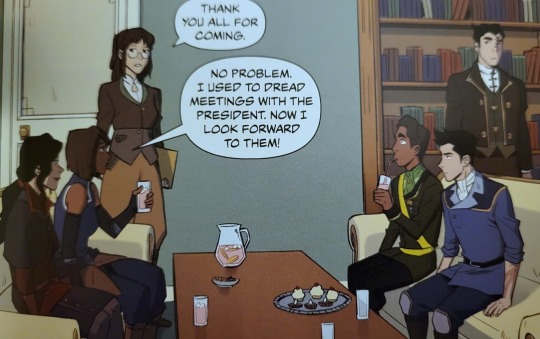
During the conversation in Zhu Li’s office, once again, visually Mako and Wu are parallel to Korra and Asami. They are sitting next to each other on a couch opposite Korra and Asami. However, there is this one moment where Mako is NOT HAVING IT with Wu. When Wu asks the Krew to join him, Mako is like, why? For show? No way. He says “We’re not your entourage, Wu.” Honestly that was kinda mean of him to say. I’m not sure what to make of it other than Mako is suddenly grumpy because his brother (who was visibly offended by Mako lamp-shading his career-hopping) snatched away a tray of cupcakes a moment before. Still, Wu is quick to reassure him that it’s not like that at all, and delivers the news of Guan and quickly makes a case that it’s the practical thing to do considering the political climate. Mako immediately agrees after that, and quickly flips his script to “we’ll keep you safe”. And Wu’s triple “yes” response with an excited fist in the air is enough of a Wuko moment for me.
When they leave Zhu Li’s office, yet another visual Korrasami/Wuko parallel. Korra and Asami are in the back holding hands, and Mako and Wu are in the front with Wu’s arm draped around Mako’s shoulders. Wu is very happy that Mako is coming along. Says they should get a smoothie to celebrate, and it’ll be just like old times! I’m sure Wu missed Mako. Mako doesn’t seem quite as thrilled but at this point it's really just Mako’s face. He just always looks like that. Who knows what he’s thinking inside.
What this means for Wuko
So if you are writing some fanfic or just coming up with headcanons with the comics in mind, there is a lot of material to work with right away. They are in close proximity for most of their scenes. Wu is accepted by the Krew, and he is buddy-buddy enough with Korra to presume he’s probably been talking to her outside of the scenes depicted in the comics. So there’s some potential for wingman or matchmaker Korra, or at the very least she will be happy and supportive of them getting together since she has warmed up to Wu a lot. Both Mako and Wu have matured enough that a healthy relationship is within reach. Wu clearly has affection toward Mako, and Mako still has that protective instinct toward Wu, even if he looks like he’s not having a great time (But like I said, he looks like that all the time, so I'm pretty sure he just has resting bitch face).
So that is about the halfway point of book 1. The next post I will talk about the second half of book 1. Some things to look forward to: a sauna scene, Mako, Bolin and Wu giving Kuvira the Bitchiest collective look ever, and Wu casually telling Mako that he loves him.
Wuko in Turf War
Wuko in RotE part 2
65 notes
·
View notes
Text
“i love you and i like you”: passion and burnout in Haikyuu!!
tw: discussions of self harm, anxiety, burnout and breakdowns.
spoilers for the whole manga!!
okay this is probably gnna be jflkafjdklfj all over the place, but i’ve been thinking a lot lately about the difference between loving and liking something, and how haikyuu emphasises the importance of both those feelings being present when pursuing a passion.

a quick look at google (and i KNOW my college professors are cringing away in horror victor frankenstein-style @ my use of google definitions but jflajfsdk bear with me!!) demonstrates how often the concepts of love and like are conflated, with love her being framed as a sort of deeper or more intense like: “to like or enjoy very much” to be specific. but personally i’ve always thought there’s something a bit misleading about that kind of definition, since its absolutely possible to love something or someone without necessarily liking them. to take a personal example: i love debate. i debated through middle and high school, made captain of the debate team, and was constantly travelling to and fro for different tournaments. even before i started to debate formally i’d jump at the chance to do mini-debates in class, argue with and rebut parents and friends over meals and causal conversation.... you get the idea. i loved debate, and still love it dearly, but i honestly don’t think i particularly liked it much. tournaments would always fill me with the most INSANE kind of stress, i’d barely eat or sleep in the days leading up to a meet, and i’ve had more muffled bathroom breakdowns in between rebuttals than i can count. after my final year of high school, i decided against joining the debate at university. i knew that if i were to retain ANY love for the activity going into the future, i had to force myself to take a break.
so what does this solipsistic tangent have to do with haikyuu, you ask? well i have no doubt that a vast majority of the players in the series love volleyball. they’re dedicated and passionate about it. they hunger for the chance to be put on the court. but do they like to play?
1. oikawa: “i forgot that volleyball can be fun”
ofc i wouldn’t be an oikawa stan worth my salt if i didn’t start this off with the (grand) king himself!! imo one of the reasons why oikawa is such a popular and well-loved character is his constant determination to keep moving forward and playing, even in the face of seemingly insurmountable opponents and adversities (”never forget my worthless pride”, anyone?). inevitably, all the hard work and practise he put into his craft has left him with a very carefully constructed, put together playstyle-- he’s the kind of player who knows how to bring the best out of each and every teammate on the court because of the amount of time he spends observing them and playing with them. it’s an outlook and playstyle best encapsulated in his now iconic line during the second karasuno v seijoh match:
“Talent is something you make bloom, instinct is something you polish!”
in my opinion the word “polish” it super significant here-- it explicitly singles out the years and years of hard work that set a foundation for his talent and instinct to shine.
but what happens when they don’t shine? there’s no denying that oikawa is an incredibly skilled and intuitive player (something that hinata’s acknowledgment of him as the “great king” to kageyama’s “king” immediately sets out) but oikawa himself is acutely aware of the fact that he can never quite measure up to his long-time rival ushijima or his immensely talented protege kageyama. oikawa’s self described strategy to deal with opponents is to:
“Hit it until it breaks”
but what happens when hitting something again and again with your carefully honed, “polished” skills yields no results? imo there’s a very clear binary mentality drawn here-- either you hit it and it breaks, asserting your superiority; or you hit it and it doesn’t break, enforcing your inferiority. with each perceived loss against ushijima and kageyama, oikawa’s internalized logic holds his own weakness up to his own face, shaking his faith in himself as a player. if you’ll pardon the on-the-nose-metaphor: the whole “hitting it till it breaks” strategy is a two-way street, and oikawa has been hitting himself, metaphorically speaking, for a very long time. i have no doubt that he loved volleyball, passionately, through middle and high school. but with his inferiority complex growing in the face of constantly refuted results, i think he slowly began to like it less and less.
so how does oikawa get his groove back? to answer that, we’ll have to turn to the post-timeskip chapters, particularly the two chapters that deal with oikawa and hinata’s unexpected meeting in Rio (372 and 373 for anyone curious!). while reminiscing with hinata over dinner, oikawa finally reveals the event that made him want to play volleyball (as a setter, to be exact)-- as a child, he watched veteran setter jose blanco step into a game and
“... inconspicuously help[ed] the ace get his bearings again... and then simply left the court.”
oikawa’s reaction to blanco’s playstyle might just be one of my favourite panels in the chapter for how it conveys so much with such little space:

the stammer of “i-i--”, which suggests a sense of resolve and determination forming in real time, finally coalesces into the determined declaration of “i wanna be a setter too!” what i took from this is that oikawa’s admiration for-- and liking of-- blanco expresses itself in the agency with which he makes his choice, in this case, actively deciding to be a setter so that he can support players on the court like blanco did. the liking that oikawa has here is therefore inherently linked to the agency and freedom he feels here-- freedom to choose his position, and how he wants his volleyball career to develop.
this recollection of his childhood memories, and the subsequent game of beach volleyball that oikawa and hinata play afterwards, essentially push oikawa back into the mental and physical space of a child or beginner, as the manga demonstrates with panels of oikawa being forced to ditch his usual carefully developed, polished playstyle to learn the ropes of beach volleyball:

ultimately concluding with the beautiful panel transition of oikawa, as a child AND adult, celebrating after a successful play:
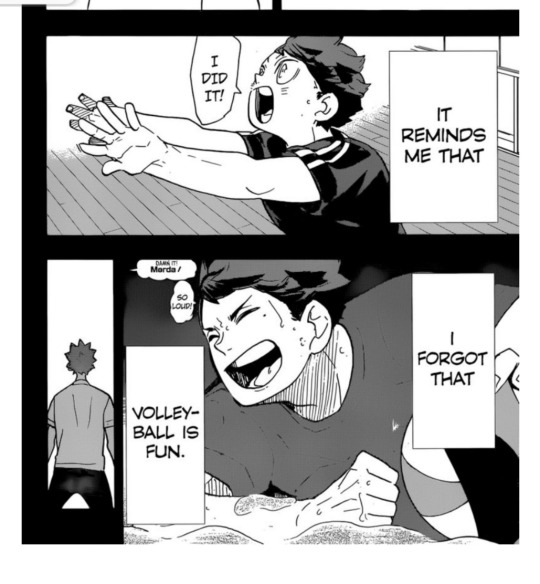
“It reminds me that-- I forgot that-- volleyball is fun.”
in a different country, playing a familiar game by slightly different rules and led back into the mentality and freedom of a novice after years of careful development, oikawa rediscovers his liking for the game.
2. kageyama: “when you get strong, someone stronger will rise to meet you”
moving on to the king of the court himself!! i’d argue that kageyama’s childhood memories and experiences of volleyball function almost oppositely to oikawa’s-- while oikawa has to re-access the sensation of being a beginner again to like the game along with loving it, kageyama’s process of coming to like and love volleyball come from moving away from his early experiences and into a new phase of playing-- specifically, his partnership with hinata.
one of kageyama’s defining features is his individualism-- he’s both skilled and solitary enough to prefer to, as he puts it, “play every single position on the court”. notably, he wants to become a setter because:
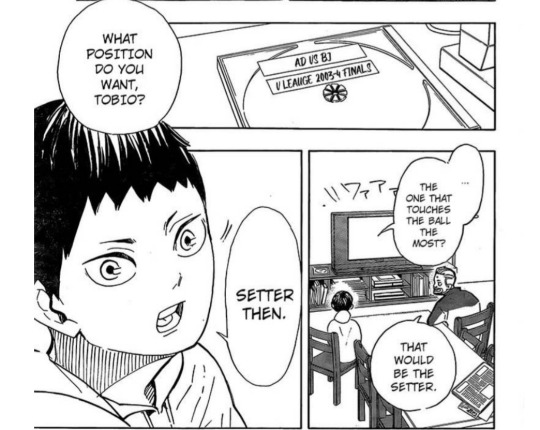
“[it’s] the one that touches the ball the most.”
in fact, i’d argue that kageyama’s “king of the court” attitude that he was known for in middle school is an extension of this individualistic mindset: he holds himself to extremely high standards, and expects his team-mates (as extensions of himself) to meet those very same standards. the similarities between his internal monologue and his commands to kindaichi in these two panels, for example, are strikingly, visibly similar:
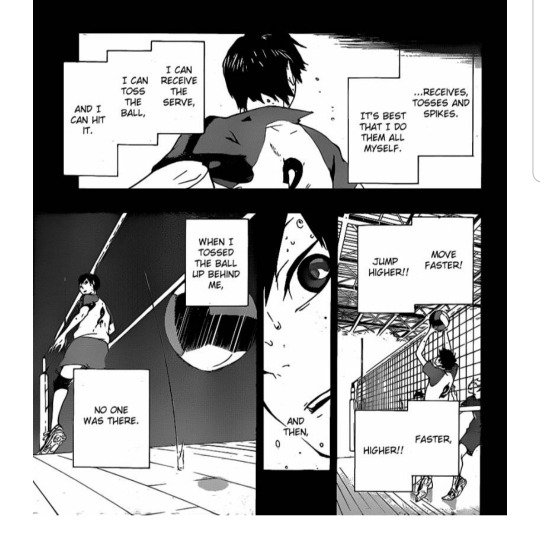
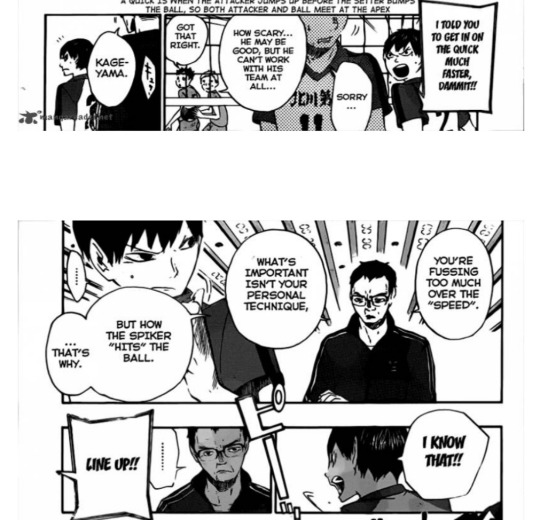
there’s that near-identical intonation of “move faster, jump higher!” that implies that the way he treats his teammates is just an extension of how he treats himself-- a deeply self-critical, miserable way, as it turns out. it’s telling that for the first few chapters of a manga in which characters’ eyes literally light up when they’re happy, passionate or excited, kageyama’s eyes are drawn as pitch black, even while he’s playing.
imo the reason why hinata’s appearance, and their later partnership, is so significant for kageyama’s personal development is because he can’t treat hinata like an extension of himself. hinata challenges him and his preconcieved notions of the sport at every turn: first with his lightning-fast reflexes and raw intuition, and then with his determination to hit kageyama’s toss no matter what. in fact, the first time that kageyama’s eyes light up in the manga is, you guessed it, when he and hinata first pull off a successful “freak quick”:
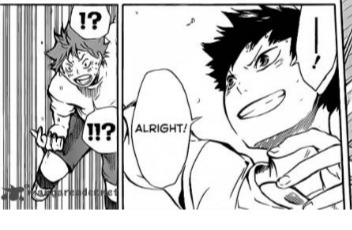
during the post-timeskip chapters we’re introduced to kageyama’s backstory in much greater detail: the way in which his grandfather fostered his passion for volleyball and the timing with which his grandfather’s illness and later death left kageyama increasingly alienated, thus further enforcing his individualist mentality. but what the chapter also gave us was an explicit confirmation of a theme that had been built up from the very beginning of the story, when kageyama’s grandfather tells him:
“when you get really strong, i promise someone stronger will rise to meet you”
i’ve seen translations of the line that use both “meet” and “challenge”, and personally i’d have to say that i prefer “challenge” for what it implies-- even before hinata got strong enough to actually meet kageyama halfway he challenged him to move away from his pre-established mindset of doing everything himself, and into one where he actually comes to enjoy-- and like-- volleyball.
3. hirugami: “maybe you’ve just had your fill”
hirugami’s case is kind of a strange one-- unlike oikawa and kageyama he’s not a major character, and his relationship with volleyball only gets a single backstory chapter as opposed to a series-long arc. but i personally ADORE his mini-arc for the things it has to say about burnout, passion and moving on.
hirugami is introduced as the youngest member of a volleyball family-- his parents, older brother and older sister all play the sport. when explaining how he began to play himself, hirugami says:
“... naturally, i started to play too. because i was good at it, and it was fun.”
imo there are a lot of really interesting things to pick apart with this phrasing: the “naturally” implies a foregone conclusion but also a degree of passivity, like he himself recognises that he was swept up in his family’s influence. the “it was fun” coming AFTER “because i was good for it” also implies a degree of correlation, as though if he didn’t have the aptitude, he wouldn’t enjoy the game (a mindset markedly different to both oikawa and kageyama). as hirugami gets older, this correlation of being good ----> having fun ----> being able to play begins to reverse, and therefore manifest in increasingly self destructive ways:
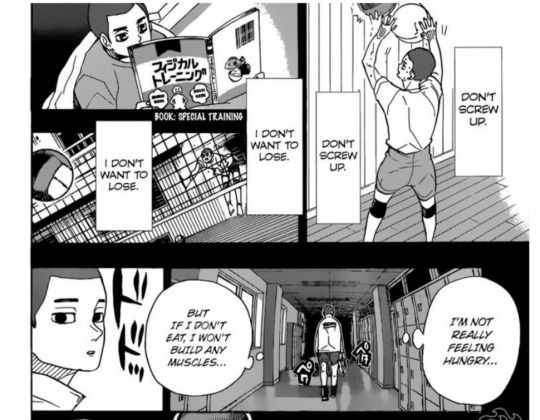
the main impetus for hirugami has now become not wanting to lose, which therefore requires a degree of heightened practise and self discipline in order to achieve. notably, having fun has been reduced to an afterthought, a state that might be achieved if he wins.
the correlation of “winning” and “being good” is a slipperly slope to go down, though, something that becomes especially apparent after hirugami’s team lose a game. the frustration of being unable to reach his goal of winning manifests itself as not being “good enough”-- acting on this, hirugami seeks to punish himself for “messing up”:

the close up panel of hirugami’s “confession” after hoshiumi confronts him hits particularly hard because it taps into a feeling that i’m sure almost all of us have felt at one point or another-- the realisation that something you once both loved AND liked is now only bringing you misery:
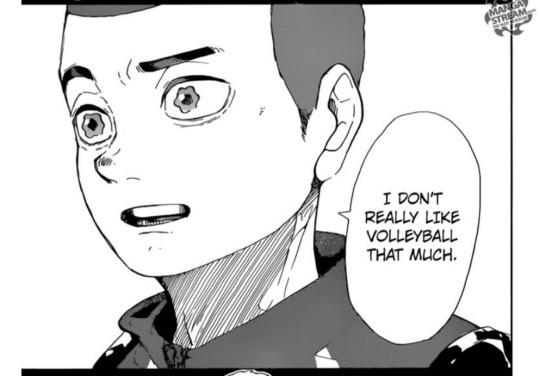
ironically, it’s actually this acknowledgement of “not really liking volleyball that much” that acts as a catalyst for hirugami’s recovery from burnout. hoshiumi’s acknowledgement of, and reply to, hirugami’s state is seemingly simple but deeply freeing:

and honestly, why not just quit? there’s nothing tethering hirugami to volleyball, certainly nothing as serious as life or death. personally my favourite part of this panel is hoshiumi’s description of volleyball as food from which hoshiumi has “eaten his fill”-- a lovely metaphor that re-contextualizes what could be seen as “time wasted” into something productive and indeed nourishing.
when we check up on hirugami post time-skip, we find out that he has indeed quit playing volleyball in favour of going to veterinary school, but he’s seen watching the game between the jackals and adlers on his phone with an eager, fond smile on his face, implying that it was the act of moving away from the table (so to speak) after eating his fill that let him still hold on to a love and passion for the game, even though he is now interacting with it as a spectator instead of a player. and indeed that might just be why i love hirugami’s arc so much-- with it, haikyuu tells us that sometimes passion’s don’t need to be re-ignited in the same way. while oikawa and kageyama rediscover their love for, and liking of, the game through a return to childhood and the arrival of a new partner respectively, hirugami’s journey away from burnout comes from recognizing that he can step away from the volleyball court, and that the love and like will still remain.
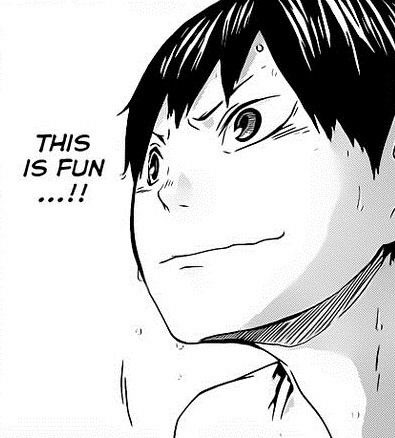
#ari.txt#meta#hq!! meta#haikyuu meta#hq!!#haikyuu#haikyuu!!#oikawa tooru#kageyama tobio#hirugami sachirou#me pointing @ myself: it's her officer! she's the one using her english lit degree to write 3k word long metas on sports anime!!#anyways jflafjsdlk this was an absolute blast to write!! and i'd LOVE to know what you guys think about it: do you agree? disagree?#please do let me know!! :>#long post
183 notes
·
View notes
Text
Episode 8 is one hella packed episode and it is an absolute joy to unpack it, beginning with this:
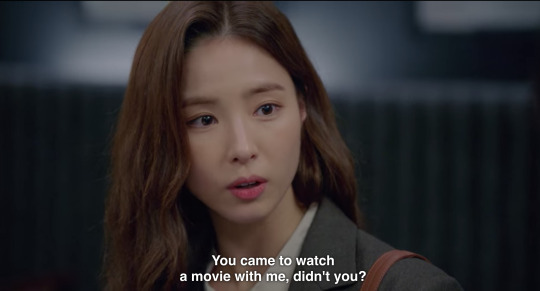
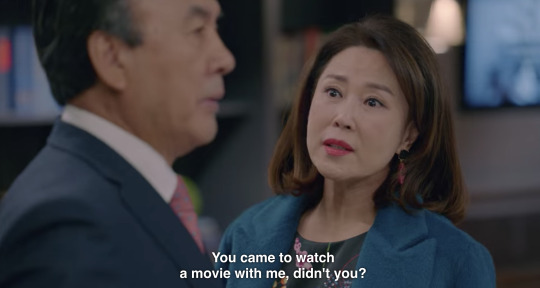
Clever, clever idea to have Ji-Woo repeat the line that Mi-Joo just said to indicate Ji-Woo is taking charge of things as far as Assemblyman Ki is concerned. It's also a good reminder of how tone and intent can change the meaning of a sentence even if the words are exactly the same (which is why we need good translators).
Seeing Mi-Joo stride across the screen with Seon-Gyeom behind her, it struck me that we've seen a variation of this many times before, beginning with the credit titles. While Seon-Gyeom is the sprinter, the one we see constantly trying to up the pace and charge ahead is Mi-Joo. She's always intent on moving ahead faster — perhaps to outrun the past that she finally makes peace with during the marathon? — while Seon-Gyeom moves at a slower pace, disentangling himself from the constraints of his troubled past and troubling father. The only one time we see him race ahead (in episode 2), we also see him come back and slow down.
What I particularly love about Park Shi-Hyun's writing is that in addition to all the layers and complexity she's written into the scenes and characters, she's also written a very, very funny show.
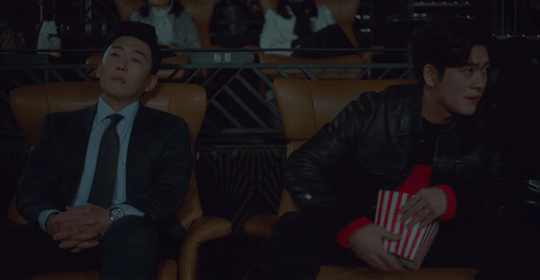
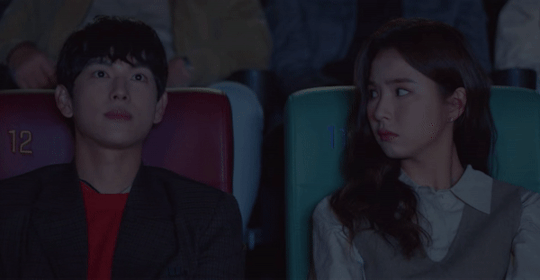
Both Shin Se-Kyung and Kang Tae-Oh do such a fantastic job with both the physical humour (without being over-the-top) and the timing that's needed to play up the wit in the dialogues. Not that Siwan and Soo-Young do a bad job — the scene in which Dan-Ah proposes to Seon-Gyeom is hilarious. My favourite is still May, who is very funny throughout this episode (the shot in which we learn she sleeps with her eyes open! GOLD).
The transitions in this episode are so well written. The insights from one scene ricochet off the next. For example, Dan-Ah in the scene at the bar — where she tells the bartender she can't risk keeping the book in her own study because she can't risk people guessing she has anxieties — gives us a look at the problems of the privileged. This is followed by a scene in which Yeong-Hwa and Mi-Joo discuss student debts, which is a relatable middle-class problem. This in turn is followed by Tae-Woong saying that he takes selfies because he's addicted to the validation he gets from the likes each of those photos gets him — a Gen Z problem. And so it is that we get a spectrum of problems that people face and hide behind performative façades.
The likes that Tae-Woong talks about pop up with manic frenzy at the end of the heartbreaking scene with Dan-Ah in the parking lot, presenting the viewer with a terrible contrast — driving away from him is the love and acceptance that he yearns for from a sister who (he hopes) knows him. All he has to hold on to is the superficial attention of the love professed by a fandom that doesn't really know him at all. Soo-Young's performance is fantastic in this scene, especially when she asks in a voice tinged with desperation why Tae-Woong keeps coming back to her despite her treating him so badly. For the first time, you realise how much it takes out of her to lash out at this desperately-sad boy. "It takes effort to hate someone," Tae-Woong tells her. My heart!
Another fantastic set of transitions comes later on in the episode, when Mi-Joo and May are unwinding at the end of a long day at the film shoot.
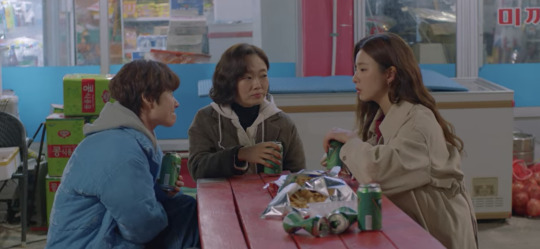
This is such a great example of writing inter-generational female friendships. When May remembers not being paid for working overtime, it's an acknowledgement that things are better for working women (especially in film) than it was before, but as Mi-Joo's experiences show, there's still a lot to be done because women are still driven by a certain insecurity and anxiety to push themselves way too hard (as we see a sick Mi-Joo do later in the episode).
Of course a man tries to break this gathering up — because he wants to go to bed. Superb excuse, particularly because these women are talking how much they have to work — and it is deeply satisfying to watch all three of them shut him down and establish their right to unwind.
This scene of female friendship is followed by one that shows the friendship between the three runners. Then we get to see a fight scene full of male actors. The machismo of that performance is a sharp contrast to the awkward tenderness of Woo-Sik and Yeong-Il's conversation.
While on the subject of toxic masculinity, this is the episode in which we find out Dan-Ah's father forged Myeong-Min's birth certificate to make him legally older than Dan-Ah even though he's actually 10 months younger than her. All to ensure he has a male heir. It's a nice detail that Myeong-Min's mother is the one laying out the memorial service for Dan-Ah's mother because it hints at a sense of solidarity.
Also dismantling traditional notions of masculinity is Seon-Gyeom, whom we see at his most domestic as he cooks and packs meals for May and Mi-Joo, and does chores around the house once they're gone. It's very much an inversion of the standard male-female gender roles with the woman going out to work and the man as the homemaker. To underscore this point, we see Seon-Gyeom consider the leopard-print shirt (that May and Mi-Joo hang to give strangers the impression they've got an alpha in the house) for a second before putting it away.
Speaking of alphas, Mi-Joo's really got a thing for wild cats. In addition to that shirt, her blanket is also a leopard-print and when we see her calling Seon-Gyeom, she's standing in front of a painting of a tiger. All these seem to be digs at her posturing that she's strong and invulnerable and I burst out laughing when Seon-Gyeom folds the leopard-print blanket while muttering, "I'd have guessed this is hers even if she hadn't told me."
As disinterested as Seon-Gyeom may be in films, they play a big role in sustaining him emotionally. In this episode, it's the film set that helps Mi-Joo and him come together after their stupid disagreement. Equally importantly, the film set is where he gets the time and space to reconnect with his mother.
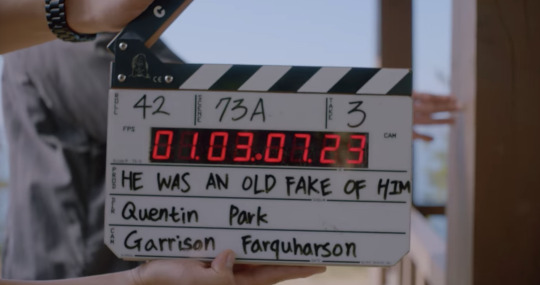
Run On has so much fun being meta with the film bits. The film shoot within a drama is indeed an old fake.
There are two film sets we see in this episode — one with Ji-Woo and the other with Mi-Joo. While Ji-Woo's set feels relaxed, the one Mi-Joo's working in is chaotic and taxing. The two women are also at different ends of the professional spectrum. Ji-Woo is a star while Mi-Joo is not just working behind the scenes, but she's come to fill in for the person who was the juniormost member of the crew.
When pointing out the main players of their film crew to Mi-Joo and May, Hui-Jin describes the cinematographer as "a bit racist, but still a gentleman". (Mi-Joo's response is superb: "Weird.") It's an interesting choice to make the cinematographer racist because that's the crew member who decides how subjects and scenes will be framed. "Racist but a gentleman" feels like a precise summary of the orientalist perspective which (aside from being overwhelmingly masculine) shows the East through stereotypes that are often superficially beautiful, but also reductive and damaging. Not surprisingly, this cinematographer is the reason Mi-Joo flounders while translating on set.
The film set is also the first time that Seon-Gyeom sees Mi-Joo's vulnerable side when she falls ill. It's such a clever choice to have Mi-Joo stop performing in a setting that's all about performances. Not only does Mi-Joo give up the alpha act when she's sick, she admits to Seon-Gyeom that when she's feeling helpless, her instinct is to resort to a performative lie — calling out for mom because that's what she saw other kids do as a child in a sick ward (imagine how isolated and neglected she must have felt to do this. Also, she's felt this way so many times that this performance has become second nature to her).
The anecdote suggests Mi-Joo's mulish championing of her self has its roots in past incidents when she tried to fit and either failed or was rejected. And yet, for all her strength and confidence, she's chasing phantoms and has been doing so since she was a little girl. All because she was alone and didn't have anyone she could reach out to for help. Which is why what Seon-Gyeom tells her at the end of the episode is so relevant. He helps her to reorient.
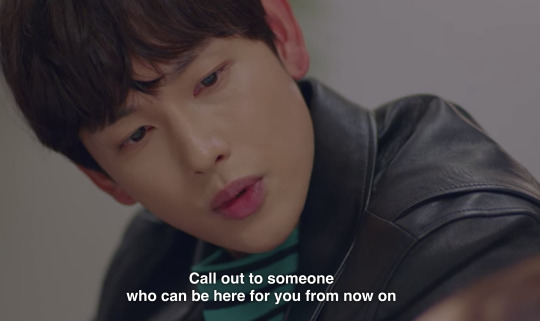
To which Mi-Joo, bless her leopard-print-loving heart, responds with
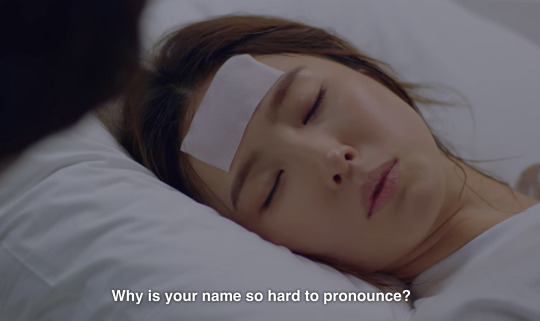
But my favourite part of this episode is the conversation that Ji-Woo has with Seon-Gyeom when he visits her set. First of all, Ji-Woo is playing a "vegan murderer", which is brilliant as ideas go and it's adorable how delighted she is about her violent roles.
I love how Run On doesn't punish Ji-Woo for sacrificing her family life for her work. Instead, it holds out the possibility that it is ok if you have that imbalance. In this scene, we see Ji-Woo's family reforming at the film set with Eun-Bi sending the coffee truck and Seon-Gyeom showing up just because Ji-Woo asked him to be there.
The mother-son conversation gives us a glimpse of Seon-Gyeom's bleak childhood and we learn that everything Seon-Gyeom did for his father was actually him doing what his mother had asked him to do. It comes as a surprise to Seon-Gyeom that his mother has noticed what he's suffered and that she understands how he'd hoped silently suffering would keep the family together. It's almost as though he's feeling seen for the first time.
Much like Dan-Ah, Ji-Woo may seem self-centred because of her ambitiousness, but she does notice what's happening beyond the obvious, especially when it comes to people she cares about. Both women are up against the worst of patriarchy. Also, I love that when she's talking about motherhood, Ji-Woo is blood-spattered — after all, being a working woman and a mother in a patriarchal is nothing short of fighting a war.
In previous episodes, it seemed as though Ji-Woo was the 'bad' (or at least not ideal) mother while Director Dong was the ideal, modern mother. Yet in comparison to how Director Dong later reacts to her son coming out, you can't help but feel Ji-Woo, with her unconditional support for her kids, might just be the better parent. What is great about Run On though is that that the script doesn't pit the two older women against each other as competing examples of motherhood or femininity. The point is that everyone's struggling, making mistakes and trying to learn from them. Ji-Woo is doing that and so will Director Dong eventually.
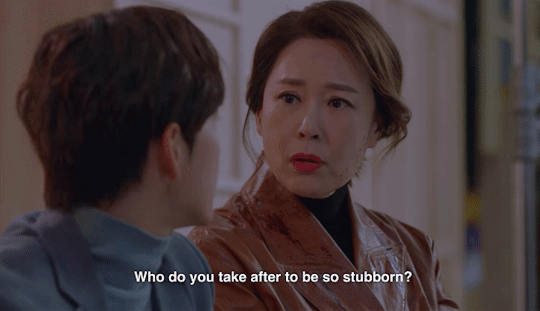
Love that the scene ends with Seon-Gyeom effectively declaring himself his mother's son. Take that, patriarchy.
93 notes
·
View notes
Text
In Defense of Teenagers:
Ok so. There seems to be a general consensus that Teenagers doesn’t fit on the black parade or that it ruins the trajectory of the album or that the song order of bp needs to be changed to fit the b-sides and drop Teenagers, or it should have just been a single- basically any option other than its inclusion between Sleep and Disenchanted would have been better. now, i’m not here to tell anyone that they’re wrong- i just want to offer an alternative perspective because i truly believe Teenagers is right where it belongs and that its inclusion on that album is, in my opinion, completely necessary to the album’s narrative arc. I want to focus on the way Teenagers builds into the foundation of the Concept Record, the way it bridges the gap between Sleep and Disenchanted so as not to delegitimize Disenchanted’s impact, and the fact that no other available material fits into the struggle the Patient endures at the end of the narrative (sorry this got LONG here’s a read more)
So, before we get into the meat of Teenager’s narrative significance, i wanted to briefly mention the way it makes Black Parade a more cohesive whole in relation to the material it is mimicking. Like Black Parade as an album is structured very differently from Pink Floyd’s The Wall- but it takes a lot of the same beats and recontextualizes them for a new purpose. Both records use war and relationship troubles and school and drugs to create an atmosphere that leads to disillusionment. In The Wall, this is quite literally the protagonist, Pink, building up “bricks in the wall” that isolates him from the rest of society and lead to a downward spiral into cynicism and hate. But Black Parade uses the same tools that The Wall does to say something different- things, specifically the actions you've made or the trauma you've endured, haunts you and makes your life seem insignificant in the face of what happens to you and those regrets are what causes the Patient to fall into a cycle of damnation and cynicism. This is representative of the Patient's descent through the afterlife- each new "layer" of the Patient's exploration is equivalent to a brick in The Wall's metaphor. Additionally, in this new context, this song in particular takes The Wall’s discussions of adolescence and the vice-grip control older generations attempt to force on teens and the disillusionment with the future and retells it from a new perspective- both literally in the fact the song is now more reflective of the 2000s post-9/11 and post-columbine culture, but its also literally from the perspective of the Patient as an adult. Teenagers, as a result, becomes a necessary piece of that puzzle- it is the refraction of Another Brick in the Wall repurposed to mean something new entirely- it’s no longer about kids being forced into complacency by a cruel education system from their own perspective (the children’s choir allows them to speak for themselves) but about the ways in which adults see those kids and why they decide to enact actions similar to those within The Wall. I mean even the imagery used in the song’s music video is purposely almost plagiarizing The Wall- it feeds into a separate analysis of the video and song outside the narrative as well- which i don’t have time right now to get into, its just very interesting that the band is bodily removed from their instruments at the end of the video and the teenagers in the audience have rendered them incapacitated (“they’re looking for a rockstar to kill” anyone?) it's the metaphorical tearing down of the wall from a completely different perspective. Anyway, the work Teenagers does for the narrative is it fits the album into the Concept Record Cinematic Universe- it is a piece that evokes the material it is influenced by to build off of the old to create the new- without it, the connections to The Wall would still be there, sure, but it wouldn’t be as complete- you cannot recontextualize the album without the foundation of Teenagers.
Teenagers is also, at its core, a subtle subversion of genre- using the blueprint of a specific kind of song to center the song within the timeline/narrative. In this case, the same way I Don’t Love You mimics and exaggerates the emotive and plaintive 80s rock ballad, Teenagers twists the classic rock of a bygone era to specifically call back on the stadium rock anthem. Black Parade, on the whole, does this quite frequently- most of its songs take pre-existing genre cues and subverts them in ways that play off of the expected tapestry of a concept record to create individual sounding songs that seamlessly transition into one another yet remain entirely separate. It maintains their presence as scenes in a larger tapestry- specifically the fabric of the Black Parade being a morality play. This serves two purposes, it allows for this exaggeration of genre to become a motif within the work (see mama, cancer, house of wolves, i don’t love you, wttbp -> they all play with a different, varied song type/structure that is distinct from each other) and it plays off of existing genre-stereotypes in ways that contribute to the songs overall function. I Don’t Love You, for example, undermines the fundamental purposes of sappy power ballads- to express one of the two dualities of love songs: the cheesy unconditional “i will love you forever” types or the plaintive, melancholic end-of-relationship song by instead focusing on the complexity of a not-quite-finished relationship. The ballad then shifts from an expression of love to one of human loss- and the loss is less about the individual speaking, but moreso about what the other character has become - it’s a mourning not for the relationship, but for the person themselves, who they used to be in a way. It shifts from the one-dimensional view of what a ballad can achieve and instead infuses the anger, the resignation, the drama, the transformation- it humanizes a very stock genre full of platitudes and uses our expectations to create something more interesting. Similarly, Teenagers takes a tired genre and utilizes the working mechanisms of its typical song structure to subvert and repurpose those into commentary- its literally a stadium rock song that devolves into a chant. Looking at the loud drumbeat that resonates in your chest, the all together now as a command that lures the listener into singing along, the addition of more chorus vocals at the end like a crowd is shouting along, the screaming and the solo on after another like the song is falling apart a little bit, all of these elements build into a song literally meant to be infectious and replicated by the audience. Herein lies one of the songs many interpretations- humans can be easily influenced by the media they consume, the perspectives they are fed. What happens when the view that we have of adolescence is cloaked in mistrust and violence? This aspect of the song is less about the band reconciling teenagers being moved to committing acts of violence and more in analyzing how an audience can be persuaded into believing the erroneous view of teens as fundamentally destructive- are you not repeating the chorus? do teenagers not “scare the shit out of you”? Obviously the band doesn’t want you to believe this but it does what you to think about why this perspective is so common. It's a cultural subliminal message that is present in songs and tv and books that we simply do not question- it is a chant we cannot help but join in on. Teenagers is a replication of that process, but is clearly just subversive enough (both as a piece of genre and just as a song in general terms) that the listener knows its commentary and not itself propagating that viewpoint. Every song on Black Parade does this kind of “genre-bending” to make a point in some way or another, so it's a significant reason Teenagers fits into the albums cohesion.
But,Teenagers isn’t just important to the album in its sound- it lyrically parallels Disenchanted in a way that effectively moves on from Sleep without losing the album’s emotional momentum. Sleep, conceptually and lyrically, is a very heavy track- its influence from the Dune soundtrack’s Final Dream turn a cinematic, swelling piece of instrumentation into an oppressive blanket of noise that bears down on the listener and the lyrics are referential to the patient believing themselves to be irredeemable and monstrous. It's also inspired directly from Gerard’s vivid and violent night terrors during his stay at the paramour- including a recording of Gerard’s recollection of those dreams, that mentions being choked, seeing loved ones die, burning alive, etc. To transition directly from such a dark, personal subject into a reflective acoustic number about the narrator’s adolescence would be tonally inappropriate and almost laughable- it would stop the progression in its tracks, while also doing a disservice to Disenchanted. Having a break is necessary! And it's even more appropriate for that break to be a song about teenagers considering Disenchanted is so nostalgic. Additionally, Teenagers brings up a really interesting narrative thread about the Patient becoming disenchanted with the youth that then directly transitions into a song about him losing faith in his values and sense of self- they are directly correlated conceptually. Looking deeper, Disenchanted is a punk song. sort of. more specifically, it is the foundation of a punk song that becomes a ballad through narrative framing- it takes punk cliches (running from the cops, the crowds, the imagery of guillotining traitorous rich celebrities) and turns them wistful and sad because the Patient is looking back at something they no longer understand or identify with, it allows the narrative to illustrate how the Patient feels like their life was worthless and didn’t amount to much and they’re just another stupid punk kid who grew up and didn’t achieve anything. and you can’t get to this point from Sleep because it would weaken Disenchanted’s impact, make it seem insignificant and petulant in the face of Sleep’s heavy and grand sorrow. Lyrically, you need Teenagers to bridge the gap between the war metaphors and the visualizations of hell and the all-encompassing nature of cancer in order to redirect the focus to the Patient and limit the scope of the narrative at the end of the album. Teenagers, within the story, then functions as the Patient reflecting on the nature of youth and, in the wake of Mama’s “we all go to hell” rhetoric, comes to the conclusion that teenagers are wholly violent, easily manipulated, and unsympathetic. It's another step in the Patient removing his own agency and viewing his life as predestined at the same time it allows the “plot” to focus back on the more nostalgic and mundane aspects of the patient’s life. Doing so makes Famous Last Words so much more significant because it forces the Patient to reconcile with his past before he can move forward (whether that's living or dying its still applicable). so, Teenagers is very important to the overall “plot” of Black Parade- it is fundamentally necessary for the pieces to fit together.
Another larger aspect of Teenagers' importance is that it introduces the fate versus free will internal debate central to the ending fourth of the record. The song lays the foundation for this thematic idea by being about the fated violence of the youth and how they cannot help but to respond to their world with anger and cruelty. This realization about adolescence by the Patient leads to him perceiving his own youth as destructive and worthless and in following the themes of guilt/regret and damnation it's this violence that began his path to hell or his current state of suffering. In that vein, Teenagers leads into the idea that your life is predetermined or that there is a destiny that we all have (in the Patient’s case its the absence of a future, or “a lifelong wait for a hospital stay”) and no matter what, you cannot fight that. While Mama gives a blanket statement about how "we all go to hell", Disenchanted centers the Patient's specific destiny by saying his whole life has led up to his illness and, looking further, there is the implication that life before that was retrospectively pointless. So, as previously mentioned, Disenchanted begins, structurally and lyrically, as a punk song- this sort of expression of youthful existence that, in any other song or under another faster instrumentation, would fit on some basement demo from 1986. But it doesn't stay that way, instead it actively subverts the genre it's cliches are lifted from- thinking specifically about “we ran from the cops” and the “roar of the crowd” that is juxtaposed with the change in structure or theme. Namely, punk songs (speaking generally here) aren’t wistful because there isn't really a sense of legacy in punk music. There's history yes, but most songs are about the immediacy of emotion, not existential questioning. The retrospective nature and the shift into a ballad structure are elements reflective of a change in the main character brought on by the disillusionment present in teenagers from a punk kid to a dying young man looking back on the banality of youth and the hypocrisy, the trauma and the lack of agency. It's so much easier to think that nothing matters and the perspective makes it so much easier to give up.
This build from Teenagers into Disenchanted regarding the Patient's fate allows Famous Last Words to become an even stronger end because it's in direct opposition to that perspective. Famous Last Words is a song that screams fuck fate and fuck the past- the only thing that matters is moving forward. The image of the Patient keeping on whether he’s walking into the afterlife or continuing to stay alive as long as possible becomes something difficult, something he had to fight to achieve - he had to struggle to find a new understanding. That he can't be "afraid to keep living" or "going home" and that these are concrete actions, a use of free will. And that free will is very specifically defiant. Regardless of how you view the Patient's end, he makes the conscious decision to accept the present and move forward. We are not fated to die alone, nor is life worthless. Black Parade proves that the opposite is true, that we must grow to accept the value of life, and it's so much stronger having the Patient actively reject nihilism and apathy. Ultimately, Teenagers introduces the main thread of the final songs and without it, those songs would be narrative incomplete.
So, Teenagers has a valued place on the album sonically and within the narrative whole, that much is clear. But another reason that the album order of Sleep, Teenagers and Disenchanted is important is that none of the other material written for the album comes close to filling its place. In this case, I am going to be specifically talking about the b-sides since the demos are incomplete and we have no idea what the final version would have sounded like (but I would contend they don’t fit either). Beginning with the easiest song to discard from the narrative- My Way Home Is Through You has its moments in the lyrics but it's completely out of place musically- plus the tone is a little too hopeful for this point in the album which does not gel with Disenchanted’s hopelessness. It's also incongruent with the album since Disenchanted is effective as the only “punk” song on a record that plays with and explores genre and having this come before it would ruin the previously mentioned motif of each of the songs being individual and unique in form. Also, it really adds nothing to the fate vs free will theme- meaning its placement would weaken the disenchanted/flw combo ending. Moving forward, Kill All Your Friends seems to fit, considering its cynicism and nostalgia, but the bridge (“you’ll never get me alive, you’ll never take me alive, do what it takes to survive and I'm still here") doesn’t fit the Patient’s slow decent into apathy at all and contradicts Disenchanted’s loss of faith in the idea of living- it's too hopeful and centers survival and resilience in a way that makes it an ineffective substitute for Teenagers as a bridge song. And finally, Heaven Help Us is too religiously centered- it would refocus the fate vs free will discussion in the context of god/angels when that isn’t a theme in the album up to this point (hell is the grounded point of the album- the protagonist has already accepted their fate by Mama- having a reconciliation with a lack of faith or the absence of God seems completely out of left field when its just not an established part of the narrative) Black Parade is actually one of the mcr albums with the least references to god/angels in the heavenly religious sense- more centered around the human struggle against determinism: the usage of damnation is Catholic inspired but divorced from the division of hell vs heaven and is instead about guilt and worthiness and agency. The presence of angels or god or any divinity would simply weaken the narrative by expanding the album's focus outside its own limitations. Also, the Patient isn't ever a martyred figure, if anything he is purposely pathetic. Including any comparison of the Patient to Christ ("give you all the nails you need") or a saint unravels the key feature of the Patient's character: that he is insignificant. His insignificance and his struggles with his past actions make him a character who must find the strength to live through the guilt and pain to prove that everyone is worthy of life. The overarching purpose of Black Parade is emphasizing that no matter what we've done and how dirty we feel, we can move forward and either accept our afterlife or we can find value in being alive. Because of this contradiction, Heaven Help Us destroys the central theme of the entire album if it is included. With all of this in mind, it seems to me that the b-sides are their own nebulous thing- they don’t tonally fit on Black Parade (though I do think they fit together and are interconnected thematically) but any of them would break the flow since they seem angrier and gritter in a way that is noticeably absent and would be at odds with from a lot of Parade’s resignation. They also just do not complete the narrative, they are simple not as good as Teenagers at bringing all the pieces together.
If I still haven’t convinced you, a bonus reason Teenagers is a valuable memeber of the Black Parade tracklist, Ray was the only one who believed in the song- he called it genius (x) so listen to mr chemical romance himself telling you the song is Good and Important :)
anyway now you should, at the very least respect teenagers based on a couple thematic ideas expressed here, if not also understand why it’s imperative to black parade as an album, as well as the narrative itself. <3
#here she is. my teenagers manifesto. months in the making :')#this is the equivalent of getting on my biggest soapbox and screaming for hours please enjoy <33#my posts#mcr assigned reading#my chemical romance#mcr#black parade
229 notes
·
View notes
Photo

Fave Scenes That Probably Could’ve Been Sent to the Cutting Room Floor But I’m Glad They Weren’t -- DiamondDust Rebellion Edition
Outside of all the Detective Byakuya scenes and The Scene Where Hisagi is Cool for 12 Seconds Before Hitsugaya Writes Him Out of This Movie Entirely, I think this is my favorite scene in DiamondDust Rebellion. It’s just a little transition, but like, frame are frames, and these ones could easily have been used to explain the plot, or something. I think you get more bang for your buck with this scene, though.
Idk, I like the idea that someone can skip town in the dead of night, explicitly against the desires of his host, but still take the time to stop and give thanks to the house. At that point it feels less like habit or cultural norm and more like something that actually matters. (Er, cultural norms matter, but like, this makes it feels like it matters at an individual and personal level.) It actually matters to Hitsugaya, specifically.
** Even though he was also skipping town in the dead of night, explicitly against the desires of his host, after offering absolutely no useful information or explanation about anything whatsoever.
I want to say it’s adorable, but then I feel bad because Hitsugaya wasn’t trying to be adorable and at this point he’s been Straight Up Not Having a Good Time Bro since minute 3 of this 92-minute film, and I want to respect that. But anyway, although I don’t think of DDR as a piece of Bleach that has a lot to offer in terms of character- or worldbuilding, this scene I hold very dear. <3 All 9 seconds of it.
I also think about this scene a lot because in the scene that follows it, Hitsugaya (who is nothing like SS Arc Escape Master Hinamori, since he runs into Ichigo basically immediately) reiterates his thanks to Ichigo with 礼を言う, his first of a few he repeats this phrase over the course of this movie. I spent like, actual weeks fixated on this expression because I didn’t know what he’d said, to the extent that I could not for the life of me Google it effectively. It wasn’t until a different character in a different series said it that my brain was like ohhhhhh derp <i>Googles rei wo iu</i>.
It’s an expression of thanks/gratitude, literally to speak rei, which is some manifestation of gratitude. It’s masculine and implies a level of distance between the speaker and recipient. From the instances we’ve now heard it, it feels pretty old-school/serious/formal, though it’s not just old-timey because we’ve heard it used in the sense that you might say “I wanted to express my gratitude” in series set in the modern day as well. There’s also a video game that uses it in its dialogue, though idk what games are so idk the context here. And then of course I got really down the rabbit hole and ended up reading about orei and linguistic anthropology, which made morse sense to me than the video game, though realistically I surely know more about video games than linguistic anthropology (I spent sever real-world years completing Ocarina of Time! vs. uhhhh I once shared an office with someone who took a class in linguistic anthropology one time.) That article is talking about something specific that funnily enough isn’t Bleach, but it’s invested in the speech acts, or speech that in itself comprises an act--for instance, that of counterbalancing a debt.
All of that aside, just figuring out the basic phrase felt like such an exciting victory!! Because now it’s a phrase we can reliably hear and understand while watching other things, even when embedded in the middle of a longer sentence, etc. and that’s always such a good feeling?? (During our Bleach movie rewatch last month we discovered that Hitsugaya also uses this phrase in Fade to Black in a completely different context/in a seemingly completely different usage, so who says filler movies aren’t educational! You learn new things every day.) So anyway, yeah, I really love this scene. Lots of wild, if somewhat tangential, memories attached to it. 💖
Also would like to point out that if Ichigo really didn’t want Hitsugaya to leave, he should have simply hidden his shoes. XDDD Foolproof. (Imagine the awkwardness of having to unlace some deeply, deeply unconscious person’s sandals as they bleed out on your sheets. Weirder than shooting yourself out of a magical cannon in order to bust into the stronghold of a society of death gods? I mean, possibly??)
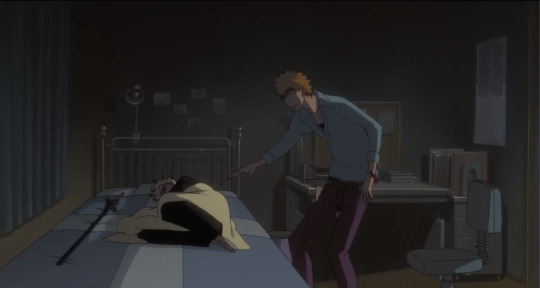
Also love (no, I truly do! “love” is used in a lot of ways on this website but I think it’s very endearing) that Hitsugaya also took the time to fold the blanket, even though he definitely bled all over it. Because like... did he WASH the blanket? PROBABLY NAH. DEFEATS THE PURPOSE OF HAVING FOLDED IT. KFAKF:gKGcfgvbhn
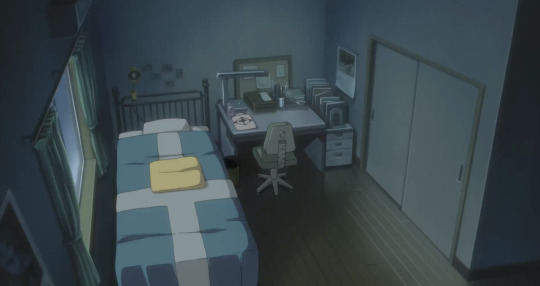
#i also think of DDR as bleach's version of The Revenant because Hitsugaya was one#'bites into the middle of live still-writing fish while standing in freezing river' scene away from being Leonardo DiCaprio#as far as the title of this post and cutting room floor stuff#boy#the amount of time we've spent talking about rust patina in the reigai arc honestly surprises even me#so you know stayed tuned for that gem#(we don't have interesting rust patina thoughts. we just talk about it a LOT)#hitsugaya toushirou#diamonddust rebellion#bleach movies#bleach language#bleach anime#bleach
20 notes
·
View notes
Text
The Emperor's Wish: My Personal Favorite [Fanfic Commentary #10]

Fanfic
AO3
His final judgment is at hand. The price is set and the plan is in motion. But Emperor Lelouch uncovers his lover's secret, and it will haunt him beyond his own death.
[FANFIC COMMENTARY]
Legit, I’m proud of this one. I don’t know why… Probably not the best either. But this was incredibly self-indulgent, and hey, it turned out so well. Would you find it funny if I told you that this fic premise was in my head ever since I wanted to write for CLuCLu? Like, after watching the movie, I was always imagining how it would pan out so differently if Lelouch had a child, and C.C. is left to care for her lover and her son.
This is my baby and my pride and joy. My only one probably 😅 There are lots of made-up quotes in that fic that I’m really (and I mean, really proud of, and I don’t say that often because my writing is ~Hit or miss~ )
Unlike One Day at a Time, this one took a genuine effort to understand characters and how they would react in this what-if situation I created in my fucked up head. 🤣😂
It was written during the thick of quarantine and lockdown last year (April 2020), and I guess that helped fuel my timeliness and speedy updates. Because I was writing fanfic for the majority of the day, with minimal breaks in-between. Some of the reviewers on FFN can attest to the daily updates I had for The Emperor’s Wish.
It started as a one-shot with the Prologue, as my way of testing the waters. When I felt secure and sure that I could finish it, I went headfirst, never looked back, and came out of the other side, proud of myself for not abandoning a WIP 😅. But that was also because I had so much fun with it. It was nice to imagine a world where Lelouch had proper closure with his friends and family.
My favorite moment from The Emperor’s Wish (aside from the blatant CLuCLu romance) is Lelouch and Suzaku’s relationship. I love how I wrote them there. I love their bromance, as well as the subtle Ned Stark & Robert Baratheon allusion towards Chapter 11: Rewriting the Stars.
Suzaku never had a brother. And Lelouch never truly liked any of his… But even if they weren't bound by blood, theirs was a bond built on so much more.
For you are the brother I chose…
Perchance if some reader is as obsessed and familiar with George R. R. Martin’s A Song of Ice and Fire as me, then I bet they would have caught that… Or not. And it was simply self-satisfaction for the writer. Either way, I. Don’t. Regret. It.
And of course, I loved writing it mostly because of the star of that fanfic: Alexander Lamperouge himself. 🤩
He’s now in my Sims 4 universe, as a spellcaster. 😂
My Loves and Regrets
I LOVE how I wrote Nunnally here, honestly. She’s not a character I’d imagine that I could ever pull off flawlessly, and while I don’t think I accomplished the ‘flawless’ part, I think I did a decent job fleshing out her reaction and what a decent conversation with her older brother and C.C. could have gone like, also her reaction to finding out she had a nephew.
I REGRET that I didn’t get to write a lot about Lelouch’s other friends -- Shirley, Milly, & Rivalz, to be honest. It just felt so out of left field for me to force their story somewhere in the fanfic retelling considering the entire story did revolve around the CLuCLu family. In my own way, I tried writing more for the three of them separately, but that didn’t push through, because for some reason my brain doesn’t work. The only one I made a decent attempt at is Shirley, but I didn’t publish the fic either. It was about her meeting with Lelouch again after a year or two. It was set somewhere in Dubai. She was supposed to meet his son, and see C.C. again, and the ending was supposed to have C.C. and Shirley hugging and Shirley tells C.C. to take care of Lelouch. It was a very bittersweet one-shot/drabble/plot idea that was never publicized.
I LOVE my shoddy attempt at drawing parallels between certain scenes in The Emperor’s Wish. One of the readers, Kurosawa Ayumi, actually caught it and mentioned it in a review. It was the scene where Alexander was playing with his Knightmare toys (Lancelot & Gawain), and how Lancelot was cleaved in half from being accidentally thrown or dropped, and then how Jeremiah put him back together again. And then I transitioned to the annals of the prison in Grahlbad where Lelouch and Suzaku were about to confront each other after two years of not speaking and assuming one was dead.
I REGRET that The Emperor’s Wish isn’t longer. Like, I wish I took the plunge to create complicated twists, but it just… didn’t feel right at that time, you know? 😅🤔 Considering how I framed the fanfic as a retelling and reimagination of Re;surrection’s plot from the start, I feel like it would be too far-out to suddenly make things overly complicated than they already are. Also, there literally wasn’t much information available about Shamna, Shalio, and the rest at the time.
I LOVE the scenes I added in the fic, and the ones I put my own fanfic twist on. Re;surrection was a movie, so for obvious reasons, there’s time constraints and not as much time to flesh out characters like in a series. I tried doing that in my own way in this fic, and whether I succeeded at adding believable details to their interactions or not, it’s up to the reader. I’m just relieved that I actually managed to pull it off, given how sucky I am lately.
The Epilogue
The epilogue for The Emperor’s Wish went through a lot of rewrites.
At one point, it was supposed to overtly show the CLuCLu family traveling through Georgia, Lebanon, etc., and about how exhausting and challenging it was to hunt Geass fragments, gather intel, and take care of a baby at the same time. But I scratched it in favor of the first scene in the epilogue that we have now -- which is Suzaku and Nunnally discussing the latest Black Knight report, and the convenience of the entire operation because L.L. and C.C. were involved in some ways.
Hence the lines:
"They were responsible for stopping that criminal, weren't they?" She asked even when she already knew the answer.
"Highly likely. Probably stripped him of his powers before they abandoned him to be caught by the Black Knights."
And then I decided to take the steamy-but-not-really route for the final scene. The vague lovey-dovey between Lelouch and C.C. There was also a slightly vague allusion to them getting married underneath a poplar tree.
Plus, the last line was the cherry on top of my favorite fic so far:
— professing over and over again how fortunate and how blessed he was to have and to hold her for better or for worse…
And not even Death was powerful enough to tear them apart.
And on that note,
It wasn’t the longest fic I would ever write, nor is it the best, but it’s definitely one of my favorites. 😊😍🥰 And I loved every second of writing it. 🥳
#code geass#fanfiction#the emperor's wish#lelouch x c.c.#c.c. x lelouch#cluclu#lulucc#lelouch vi britannia#c.c. (code geass)#lelouch of the resurrection#fukkatsu no lelouch#wbad blog#wbad fanfiction#fanfiction commentary
31 notes
·
View notes
Text
Season 8, Episode 1: Open Season
Work was busier than expected on Monday, but the deep dive into the first episode of S8 begins now!
Scene 1: Narration, Elizabeth and Nathan, Lucas
The awkwardness between Elizabeth and Nathan was...palpable at first lol.The best part about the non-narrated part of the scene is twofold: Nathan interacting with Jack is a well-needed and very nice touch, and of course it’s always nice to see that Nathan is patient concerning Elizabeth’s situation and reassures her that she can let him know when she’s ready to go to dinner with him.
My problem with the whole thing is that...if she hasn’t spoken up about wanting that dinner date yet, and she’s not saying yes she’d like to get dinner with you now, it’s like...any sane person would assume at this point in the story that Elizabeth isn’t interested in Nathan. Worse, Nathan isn’t the kind of man who wouldn’t take a hint. I’m pretty sure this is why the opening scene felt just a little bit off. I think they ought to have let Elizabeth be a little more enthusiastic about the idea while still failing to commit to it.
To be fair to the writers, I can’t imagine it was easy for them to figure out how to open this season after such a long time gap. They let a whole winter elapse between last season and this one. How do you explain literally no major development with the love triangle in that amount of time? Especially after the way the last season ended?
Random consideration: the camera focuses on Elizabeth’s face a lot and makes her wedding ring clearly visible.
Boom, the flashback with Lucas. I think having him leave out of jealousy was a better idea than having his mother fall ill (we’ve certainly seen that enough at this point), and maybe we should also consider the fact that while Lucas was gone, Nathan didn’t really jump on the opportunity to woo Elizabeth himself.
I wonder if we’ll get an explanation for that or not. What makes Lucas so sure that after 4+ months, Elizabeth hasn’t started courting Nathan? Maybe he kept in touch with someone in town? Or he just knows Elizabeth well enough to know she wouldn’t feel quite ready to commit in that time frame anyway?
I did really like Lucas’s opening scene with Elizabeth. Honestly, he was quite likable, here: admitting he was wrong, admitting his shortcomings, apologizing. All good things. “I’m ashamed I let my jealousy get the best of me... The worst of me.” That’s such a good line.
It didn’t feel equal in enthusiasm to the Nathan scene, but I’ll have more thoughts on that later. I do believe it was on purpose.
--
Scene 2: Clara and Jesse’s Fight, The Café
I like the concept of some marital discord for Clara and Jesse. Marriage is easier said than done and like any serious relationship, it’s a lot of consistent maintenance. It starts out pretty well, with Jesse sleeping in the other bedroom. At this point I fully expected to find out Clara kicks in her sleep or she snores a lot or something that’s funny to hear about but really difficult to actually deal with in real life. Color me disappointed later, but I’ll get to it.
--
Scene 3: The Mercantile, Ned, Florence, Carson
This just set up things with Faith’s situation so there’s not much to say, but as always I do love Florence. I hope she gets some good scenes this season. And I love Ned so I hope the same for him.
Henry coming in to mail a letter was interesting, though. I’m not sure it’ll mean anything in particular later, but...it’s possible. Then again, maybe he’s just here to set our expectations regarding Faith’s return (of course it’s a long trip from Chicago) or Carson’s worry (a bit unreasonable unless he expected to hear from her at a specific stop).
--
Scene 4: Nathan, Dylan
Dylan is such an incredible scumbag. The spurs were a nice touch. He says things almost fondly (“She’s growing up... My little girl.”) and then wants nothing to actually do with Allie.
The guy’s actually a pretty good actor. The way he segues into being glad for Allie’s sake that Nathan wasn’t the one killed. If the next words out of his mouth weren’t a demand for go-away money you’d almost feel those words were genuine!
--
Scene 5: Lee and Rosemary’s Return + Faith’s Return + Dylan Part Two
Lots of energy in this scene, both good and bad. I always appreciate what Lee and Rosemary bring to the show. I genuinely just don’t care that much about Faith. I’m ready to ship her with Cowboy Brett Brewer. He gets a name, which makes me wonder if he’s gonna show up again. :3
Lol at Carson’s jelly face:
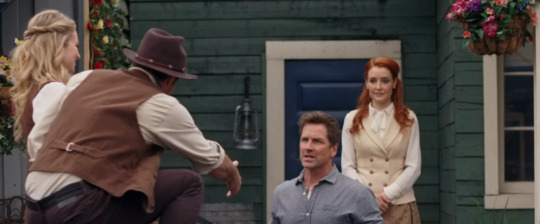
I MEAN...
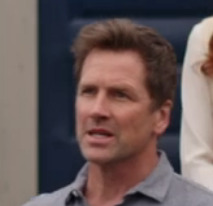
Not a fan of Faith’s outfit...but to be fair we’ve never really seen Faith outside of uniform. That just doesn’t strike me as something she would wear to travel in...?
Dylan approaching Jack and Jack speaking to him was so hilarious to me. “A puppy!” It’s extra funny after he looked afraid of Rosemary. Nathan intervening was undoubtedly for the best, but I can’t imagine why he would have approached Elizabeth or Jack. He doesn’t know who they are, or their connection to Nathan. Maybe too convenient. Might have been better to have him approach someone else entirely--like Opal.
--
Scene 6: Nathan and Allie
It’s great Nathan’s officializing the adoption but he had literal years to do this and only chooses now, when there’s a threat? Legally Dylan doesn’t have a leg to stand on even in that day and age (he did the abandoning in the first place + Nathan is a lawman)... It kind of ruined the cute moment for me, and I think it will come back in a bad way later.
I don’t mind Nathan’s inability to confide in Elizabeth in this situation. At this point, she doesn’t need to know, and the situation is just weird enough that he probably doesn’t think he needs to dump his own problems on her.
--
Scene 7: Carson and Faith
I’m the jerk who just chanted “BREAK UP BREAK UP BREAK UP” during this scene in my head. I just...don’t care about Faith and Carson.
--
Scene 8: Bill and The Gals
I hate that they keep retconning Bill’s ability to cook well with every passing season. In season 2 and 3 he was more than satisfactory. In S4 he made dinner for Dottie and it was really nice. Now he’s godawful and doesn’t taste his own shit before letting other people try it? Come on.
This is the kind of stuff the writing team needs to cut out of the story. It’s not funny.
Worse, outspoken Fiona lying to Bill? I just don’t see it. At least Molly told him the truth...but I still am just SO tired of seeing this shit. It makes me think new writers only watched the last couple of seasons instead of all of them.
Also, if Bill is literally running the cafe most of the time, if he was bad at cooking, then...the place would have shut down ages ago. What they should lean into if they wanna do a cooking joke is that Bill isn’t good at creating recipes from scratch. Maybe he doesn’t have a strong sense of taste (my husband has this issue so it’s the first thing that comes to mind) so he’s likely to over-do things like spice or sugar or salt on accident. There’s also a lot of room for jokes about his “taste” in things that can come of it (women, clothes, et cetera).
--
Scene 9: Lee’s Pants
Good scene, 10/10, wouldn’t change a thing. I hope this pants thing becomes a running gag. This is the good kind of humor I want in my life. And I like that Jesse wants to emulate Lee. It’s wholesome.
--
Scene 10: Rosemary and Clara
The ribbon as a tissue was funny, but it was just SLIGHTLY too over the top for me.
--
Scene 11: Faith and Carson Again...............
“Were you jealous of that cowboy?” I think he should be. The cowboy is better. I don’t give a damn about these characters. And I genuinely hate that the strumming is Carson’s Thing Now. At the very least we should get some Carson and Bill doing a duet together which would be cool.
It just felt like it was shilling Paul and had nothing to do with the characters.
--
Scene 12: Mmm Money
This is arguably the most interesting scene in the episode. Lucas nodded at Nathan. Nathan went to Lucas for money. Lucas didn’t need to get the scoop to find out why Nathan needed it to loan it to him. Elizabeth is officially the least interesting part of the love triangle.
They treat her like she’s such a prize to be won, but I’m starting to worry that she’s become the new Lorigail on the show.
Anyway this scene had some gay vibes and I liked them.
--
Scene 13: Rosemary and Elizabeth Catch Up
YES. GOOD SCENE. It starts off fun and it gets serious, and the transition feels really natural. “Did he have reason to be [jealous]?” I’m genuinely glad this is in the episode. It needed to be. I hope Rosemary continues to ask the hard questions.
Elizabeth needs to face either dating one of them, or dating neither of them so that everybody can get on with their lives. If you’re not that enthusiastic about either of them I’d say...maybe don’t date either of them idk.
--
Scene 14: Nathan and Bill Talk
"If he sees you with me, then...” The problem with this scene is uh...twofold, let’s say.
Issue 1: ThEN HE WILL WHAT, NATHAN? WHAT HAS HE EVER DONE BEFORE THAT WAS SO BAD if he’s not a hard criminal? Maybe an example would be useful here...?
Issue 2: The old Bill Avery would have heard “if he SEES YOU with ME” and mentally been like, “all right so it’s only bad if he SEES ME” and spied on Nathan.
Nathan wanting Bill to stay behind in case Dylan doubles back isn’t a terrible idea, but it almost comes across more like...the writers just want Nathan alone.
--
Scene 15: Oil
I like the discussion and that Hickam gets to do something. I feel like Henry is low-key advising against shooting the well, and that Lucas and Hickam will end up doing it and causing an issue. It’s just setting up for the future and it’s nice to see those kinds of scenes in the series again!
--
Scene 16: Jesse and Lee
I’d like this scene more if I felt it gave us ANY insight into the problem Jesse and Clara are having. It mostly comes across like Jesse gets home and does nothing at all until bedtime and Clara is lonely. Could have been a better scene. It’s mostly just repetitive right now.
--
Scene 17: Nathan Cancels the Date
“Tomorrow’s Saturday.” Nathan’s like uhhhhh. This actually works really well to do what it’s supposed to do. By that I mean, he seems “off” so Elizabeth realizes he’s a bit stressed and leaving town = mountie business = dangerous.
I kind of wish Rosemary and Elizabeth would talk more about this, but maybe that’s coming in an episode soon...?
--
Scene 18: The Barbershop
Just a cute nice scene that shows a good friendship between Fiona, Clara, and Faith. I like this stuff. Keep it coming, Hallmark!
--
(Skipping Scene 19 because it’s just Nathan riding around...)
--
Scene 20: Lee and Rosemary Scheme
I really enjoyed this little bit where they decide to buy something for Clara and Jesse and we don’t get to see what it is. Super wholesome and very fun!
--
Scene 21: Nathan gets Ambushed
This scene was absolutely wild. Probably one of the best scenes like this that they’ve ever done. Dylan taking Nathan’s hat, “Take care of my little girl” after he takes the money and Nathan’s gun. It was super good.
Also, not too fake that Nathan was on the ground that long. If you got roped off of your horse you’d have the wind knocked out of you super hard lmao.
--
Scene 22: Bill & The Girls
Clara and Fiona are so cute. Bill playing the “Dad” figure to them both is really nice and it’s good for him. “I’m a lawman. I get to sneak.” What a Bill response.
--
(Skipping Scene 23 since it’s just Nathan finding his horse.)
--
Scene 24: Lucas visits with Elizabeth
Lucas and Elizabeth are flirting via a nursery rhyme. I...don’t like that LOL. But Lucas’s “Helen Bouchard taught me to read and after that I was on my own.” She really sounds unloving. This was a pretty decent scene, though.
Also, Grand Isle Louisiana had a major hurricane in 1909 and 1915.
They also seem to have been hit by more mild hurricanes in 1916 and 1917, but the 1915 one was a Cat4, so...the most notable.
--
Scene 25: Rosemary and Lee in the Dress Shop
This tries to solve the issue of Clara and Jesse’s marital problems, but it doesn’t actually do that. “Let Jesse read when he gets home.” “I’ll talk to Jesse.” Meh.
--
Scene 26: Barbershop
“Why do this when you’re so good with women’s hair?” I fully expected Fiona to say, “That’s where all the hot gossip is, of course.” I do like her gumption, though!
--
Scene 27: Nathan Finds Dylan
“I had to let you ambush me, so I had grounds to put you away.” COLD BUT EFFECTIVE. I appreciate this.
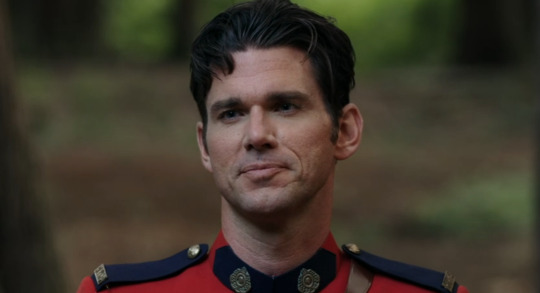
Imagine getting to be this smug. I wish it were me.
Anyway, long-term thoughts on this are mostly that...there is just no reasonable way Dylan’s story is over yet. It’s too juicy of a storyline to let go this easily. Allie is going to find out what Nathan did and she’s going to struggle to come to terms with it, especially after her grandfather really did try to turn his life around. Why couldn’t it be the same for her father? Why couldn’t she get lucky like that?
I hope it feels satisfying, whatever they choose to do. Otherwise this was just wrapped up too neatly/too quickly.
--
Scene 28: Nathan Returns
Very good scene. Nathan’s in a good mood and he does my favorite trope of all time when one person in the relationship has a child: “Why don’t we all go?” You already all know each other, so why not? It’s wholesome and good, and it shows he doesn’t care how he gets to spend time with Elizabeth, as long as he does.
Also, it takes a lot of the pressure off of her for the duration of the date and at its conclusion. This was a cute and good scene, one of the better they’ve had, I think.
--
Scene 29: Jesse and Lee Talk
This was a nice attempt at a talk, but it really comes off like Jesse has stopped loving Clara for no reason. That his romantic interest in her is what is causing the failure in their relationship.
The problem is: WE HAVE NO IDEA WHAT IS CAUSING IT. NOBODY EVER SAID.
I agree that love isn’t “just” a feeling or “just” an emotion. It’s ALSO a choice. Marriage is a commitment you choose to continue every day. That is all good.
“Choose love. Then you feel it.” is probably some of the worst dialogue they’ve put in the show, though. Yuck. It left a bad taste in my mouth. It feels like it’s shaming people who legitimately fall out of love or who are in bad relationships. “If only you chose to work harder.”
I don’t think that was their intention at all, but it really soured the scene. I would have MUCH rather have had Lee get Jesse to talk about what’s wrong and then offer him pointers on how he could do better. Maybe he’s stressed out and losing himself in books, or he wishes Clara would sit and read with him because that’s something he always wanted. Or maybe Clara would be down for reading time if he read to her while she did her sewing.
There’s so much they could have done here to really send this home, but it didn’t work very well. At the very least Lee could have said, instead of ‘choose love’: CHOOSE COMMUNICATION. Make sure she knows you still feel that way about her.
The biggest thing is like, Lee could also be very encouraging in saying like, the honeymoon phase doesn’t last forever but just because things settle down doesn’t mean the love is less.
THERE IS SO MUCH GOOD STUFF THEY COULD HAVE WRITTEN FOR THIS but they chose “Choose love. Then you feel it.” WTF. That’s awful advice.
--
Scene 30: Jesse and Clara
Him bringing her flowers was a nice touch, and her getting him the book was also nice. The tandem bike was SO unexpected to me and I loved it. It’s just goofy enough that it works. The best part is that they know it’s not going to fix anything, but it’s still a fun and nice thing to do, and that’s wonderful for Rosemary and Lee. They both like to make the people they care about happy.
--
Scene 31: Mama Bouchard
MILF ALERT.
Elizabeth is just so shook at all of this she doesn’t say a damn thing for so long it made my palms feel sweaty.
“Someone ought to take an interest in your writing, don’t you think?” I rewatched the episode to understand the tone, and it’s a little hoity-toity/uppity, but she actually doesn’t sound condescending. It’s good for an editor to meet the author, after all, and meet to talk about their writing/book. This has always been custom, even in the early 1900s. Authors didn’t usually get their work published by an editor they’d never met (though of course, you will find some exceptions).
From the little we saw, Helen seems fine. The preview for the next episode tells us she’s UH, AN EDITOR DOING HER JOB, so I’m not looking forward to the editor being the bad guy, but I guess I’ll have to deal with that when it arrives. (To be clear, Elizabeth has never proved to the audience that she’s a Good Writer, let alone a Great Writer. She’s also not experienced which means her work probably NEEDS SOME WORK.)
Anyway, Elizabeth is immediately rude as HELL. Nobody can make an excuse for this. Helen isn’t THAT big of a deal. There are other publishers. Your father is filthy rich. If she changes her mind about your book you can pub to someone via your father if you have to. Like...Helen wouldn’t have taken you on if she didn’t see any potential in you.
Even if it was a big deal, Elizabeth has NEVER been a flake. EVER.
This is a classic case of a writer forcing the character to go out of character in order to bend to what the plot dictates.
If I were Nathan, I’d drop Elizabeth like a brick.
How to fix this scene? I’ll honestly have to think about that for a while. This was the first hint of truly bad writing this season. The bit with Lee and “choose love” was careless writing, but this scene with Nathan is just Bad.
The thing is, I KNOW WHAT THEY ARE DOING. I know they put this in there so that it looks like she’ll choose Lucas because she never even goes out with Nathan, and then BOOM. I know it’s meant to be this big thing about how she’s scared to feel anything for Nathan because Lucas is the safer option and also a good man (so why would she fall for the more frightening option?).
But this was not the right way to do this type of scene. I hope to God in the next episode someone says something about it. Allie could tell her it was rude and it hurt Nathan’s feelings/you shouldn’t have said yes if you didn’t want to. It’d be fully in character for her. Rosemary could also say something similar. If they do, I might be able to forgive this...but if it’s not called attention to by the other characters, then it’s a massive failure as a scene to me.
--
Did I miss anything? Do you want my thoughts on something in particular? Shoot me a message HERE and I’ll do my best to answer!
20 notes
·
View notes
Text
185. porky’s hero agency (1937)
release date: december 4th, 1937
series: looney tunes
director: bob clampett
starring: mel blanc (porky, emperor jones), tedd pierce (gorgon, assistant), sara berner (porky’s mom)

the final porky cartoon for 1937, and what a busy year it’s been for him! hard to believe he had an entirely different voice, look, and demeanor just 8 months prior. even then, his character still had much to explore, as we see here—in this cartoon, he’s cast as a child again. curiously, bob clampett is often credited as the one who refined his personality into the one we know today (he did give him his iconic suit and tie), but, like everything else, it was more of a collaborative exploration by all of the directors.
the title card is one of the more interesting title cards in the warner bros. repertoire—it’s a photo of a porky statuette! bob clampett would make several statues during his time at WB and distribute them to his top animators. while the statue in the credits is painted over, you can view an unpainted model here!
here, porky dreams of the wonders of ancient greece, prancing around as the mythological messenger parkykarkus. however, a gorgon has her sights set on turning him into stone, and it requires some quick thinking from porky to weasel his way out of this mess.
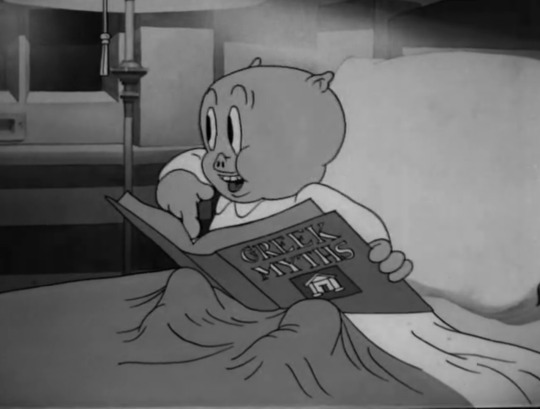
bobe cannon animates the expositional sequence, with porky propped up in bed, sucked into a giant book full of greek myths. his mother (offscreen) tells him it’s time to go to sleep, but porky objects, protesting that he was just at the exciting part. cannon’s animation is easy to spot with his trademark buck teeth, yet the gestures he gives porky--finger points, turning the page, etc.--give him a nice dose of youthful energy as he recaps the story, telling tales of gorgons and “great great great” greek heroes.
nevertheless, a disembodied hand turns out the light, dismissing porky’s protests. he heaves a resigned sigh, lamenting how he wishes he could be a great greek hero.
the cartoon doesn’t make any attempts to keep the dream sequence a surprise--instead, the face of the book’s cover takes up the entire screen, the pillars emblazoned on the front melting to life as we fade into ancient greece. and, as to be expected, our favorite porcine hero proudly stands in front of the building, proudly advertising “HERO FOR HIRE AGENCY -- PORKYKARKUS PROP.”
porkykarkus is a play on parkykarkus (”park your carcass”), a character on eddie cantor’s radio show “the chase & sanborn hour”. truck into porky’s services as he narrates over the specials:
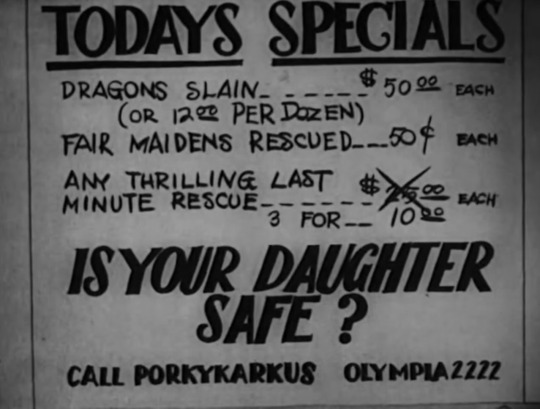
“has anybody any eh-deh-deah-deah-dragons you want seh-seh-sleh-slay-slaye--rubbed out? or maybe ya have some, uh, fair meh-mai-meh-maide--honeys ya want rescued! it’s a peh-pleasure. is your daughter safe? phone eh-peh-porkykarkus at olympia 2222!”
porky’s narration, as always, is fun to listen to, and the physical advertisement has its own charm and appeal, with discounts and deals on certain rescues. not only that, but it’s a damn smart way to save money, having just the narration over the still frame. smart thinking!
conveniently, porky gets a phone call, sparking the tried and true “gear up for a big sprint but merely tinker on over to your destination” gag. as porky answers the phone, filling us in by repeating the hidden dialogue from the other line, we find out it’s the emperor--he wants one hero to go.
chuck jones’ layouts stick out quite strongly throughout this cartoon, especially in the human designs. porky’s statue of mercury is no exception--the bulbous nose and rounded body construction are all surefire trademarks of his work. porky grabs the messenger’s hat and winged shoes from the statue, never once taking a beat to stop as he hobbles along, dressing as he prepares to head out. woodblock sounds simulate the sound of his hooves clopping, but also add an extra jaunty jive to the merry score of “have you got any castles?” in the background, the cartoon’s motif. it would also be a merry melody courtesy of frank tashlin not even a year later.
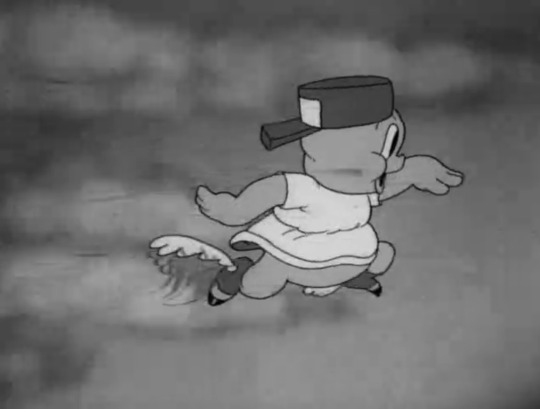
with that, porky takes off, soaring in the skies like a pro with his winged shoes. if the scene wasn’t appealing enough with the overhead layouts, the animation of porky steadying himself is wonderfully smooth and fun--the cherry on top. he circles the palace where the emperor is located, swooping down to his destination. complete with airplane sound effects, of course.
“howdy, empy!” another bulbous-nosed jones character silences porky from behind his armchair. emperor jones (boy, who could that name reference, i wonder?) speaks in a ridiculously hilarious dialect, completed with a thick accent: “shh! i’m making a fireside chat with my sheeps!” his voice then slips into a rooseveltian draw as he coos “my friends, grecians and customers, this is emperor jones speaking...”

pan to the audience, which consists of a sea of smiling statues. this entire speech sequence is wonderful--not only is his terrible grammar terribly amusing, (”statistics show... what last season at this time was population in greece from 6,000 with 500 with 54 people, with 17 statues.”) but little touches such as one of the audience statues roasting marshmallows and later a hotdog over the fireplace, the emperor making his audience clap by pulling on ropes tied to their arms, and so forth make the entire charade highly amusing with lots of details to look out for. porky standing idly in the background, awkwardly fidgeting as he tries not to intrude is a great little piece of character animation as well.
the emperor gives the skinny, all while chowing down on a hotdog: a gorgon has been turning more and more people into statues, and they need a hero to steal her life-restoring needle in order to turn all of the statues back into humans again. the hero he has in mind is, of course, porky, who bashfully accepts the offer. when the emperor asks those in favor to raise their right hand, he pulls on a lever that causes all of the statues to raise their hands in unison, including a hand on a nearby clock. with a handshake, empy concludes “it’s a deal!”
one of the most impressive pieces of animation in the cartoon (i actually dedicated an entire drawing to it!) is when the emperor sends porky on his way, who waves goodbye as he flies through the air with his winged shoes. just as he tips his hat, he knocks into a pillar, which sends him tumbling upside down, but still airborne. the wings on his shoes form hands as they shake their fists in the glory of the good landing, with porky flashing a cheeky grin to the audience before spiraling lower in the air, regaining his balance, and barreling onward towards a smoldering volcano. the animation is full of life and character--though porky is consistently jolly in the B&W clampett cartoons, the grin towards the camera as he prides himself in his save is a great little touch of personality. slowly but surely, bits of character are now becoming more defined.
a gag that took me just now to recognize it--porky swoops into the heart of the volcano, where we spot the source of the black fumes pouring out the top: the gorgon statue factory. a merry score of “you’ve got something there” serves as some easy listening as we’re treated to a sign gag:
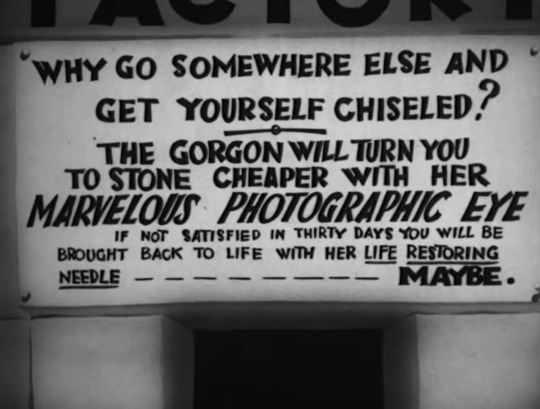
outside of the factory is a human picket fence, comprised of familiar faces: statues of bobe cannon, norm mccabe, john carey, bob clampett himself and chuck jones surround the area. directly outside of the factory is the frozen statue of a salesman with his foot in the door--the joke is not only amusing, but the pose is quite strong and readable, too. though nowhere near the dynamism of frank tashlin’s poses in the mid ‘40s, clampett’s poses in this cartoon are quite defined and exaggerated for the time period. this is especially sharp in the scenes with the emperor.
porky knocks on the door held ajar by the ceramic statue’s foot, holding out an envelope. “telegram for the guh-geh-gee-geh-gee-gor-geh--” a hand snags the envelope out of porky’s grip, causing him to mutter “aww, nuh-neh-nee-nuh-neh-neh-nut--shucks,” a phrase he echoed in clampett’s previous entry, rover’s rival.
we transition to the inside of the factory, where we see the gorgon herself, positioned in front of a camera, awaiting to take “pictures” of her models. tedd pierce voices the gorgon, whose vocal stylings are a parody of tizzie lish, bill comstock’s character on al pearce and his gang. interestingly, the cartoon before this, the woods are full of cuckoos, featured a caricature of lish as well, also voiced by pierce.
clampett and pierce’s comedic timing is sharp--not nearly as sharp as tashlin’s timing in the woods are full of cuckoos, but abundantly amusing nonetheless. the gorgon asks for a boy--”a sorta young-ish one”--and in comes a decrepit old man who can hardly hold himself up. the gorgon waits for the man to assume his position on the podium where his picture will be taken, singing a pitchy rendition of “am i in love?“, another homage to the characteristics displayed by lish’s character on the radio.
the gorgon snaps her photo, which turns the shaky old man into a stone statue at once, cheekily labeled “ANTIQUE -- $60,000 (P.S.: 000,000)” before he’s yanked off of the podium with a cane.
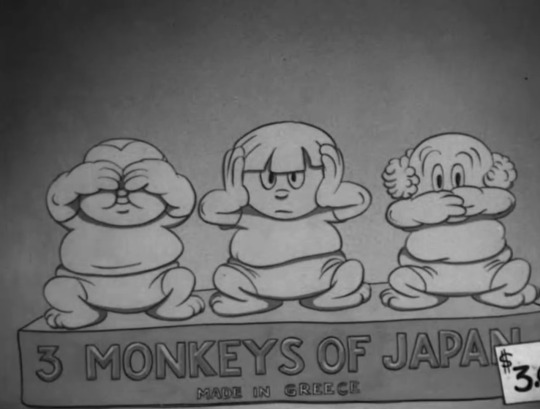
“now let’s try a group picture.” you know it’s a ‘30s cartoon if the three stooges come waddling in--they made their caricatured, cartoon debut in the 1934 film the miller’s daughter, notorious for being chuck jones’ first animation credit. as expected, they all beat the tar out of each other while on the podium, rendered immobile only through the power of medusa’s camera. they turn into the three wise monkeys, labeled “3 MONKEYS OF JAPAN -- MADE IN GREECE”.
norm mccabe’s animation is easy to spot in the next scene with porky, characterized by his signature double eyebrows. porky knocks on a door, parroting a favorite catchphrase from the al pearce show that frequented many a clampett cartoon: “i hope she’s eh-eh-at home, i hope, i hope, i hope, i hope, i hope...”
porky shakes the hand of the assistant, unfortunately a blackface caricature (save for the voice, who is just tedd pierce speaking in a deep, suave voice) as he greets “welcome, stranger. won’t you come in?” before porky has time to answer, he’s yanked through the iron bars of the door and placed neatly in line for the photoshoot, where he peeks through the door to see the action inside.
a pile of men form a pyramid, where the camera turns them into a literal statue of a pyramid, with some slight imperfections. “aw, shucks!” laments the gorgon. “you moved!” she approaches them with her life restoring needle, allowing the men to form into the proper position, maintaining good balance. she gets her “genuine egyptian statue”, quipping “ought to make a handy paperweight!”

the assistant informs porky that he’s next. porky backs up anxiously, echoing a short-lived catchphrase of his from the joe dougherty era: “nuh-neh-no! eh-nn-nee-no! a-a thousand times no!” the decision to make his thoughts visible (his head is slapped onto that of a piggy bank’s) is playful, and also reflects just how big of an influence comics had on bob clampett’s work: comic artists such as milt gross and george lichty have been cited by clampett as inspirations. the george lichty influence is definitely noticeable in rod scribner’s animation under bob clampett, as we’ll discover in the coming years.
in the midst of his panic, porky backs into a statue of "dick a. powello” (dick powell and apollo), causing it to break. but, rather than fuss over the mess, porky uses the opportunity to hatch an idea instead.
in comes strolling porky, concealed by powello’s upper body and a blankett hiding his hooves. the triumphant score of “he was her man” and the gorgon’s smitten woos makes the scene hilarious as is, but the blanket falling off and revealing porky’s pudgy little hooves is the icing on the comedic cake.

porky perches himself on a conveniently placed couch, where the gorgon approaches him. “pardon me, is this seat taken?” she doesn’t wait a wink before snuggling right up to him, a heart symbolizing her affections popping in the air. though clampett would play with typography at times and maintain an overarchingly jovial mood to his cartoons, it’s an odd thing to see him play with comic-like visuals in this manner, such as porky physically envisioning himself as a piggy bank or the heart from the gorgon. i wish he had done it more in this nature!
with the gorgon too close for comfort, porky uses this as an opportunity to grab the gorgon’s life-restoring needle, dangling from her neck and lying against her body. it wouldn’t be a clampett cartoon without sexual innuendos--porky reaches aimlessly around for the needle, prompting the gorgon to let out a shriek, cooing “why, mr. a POWELLo!”
she smothers the ceramic head in kisses, giving him a nice lipstick finish to boot as she pretends the statue has given her a ring. her ecstasy is hilarious and WONDERFULLY conveyed through strong, rubbery poses worth freeze-framing. picturing porky’s befuddlement is another humor within itself.
finally, porky’s disguise is revealed when the gorgon literally crushes the statue in an embrace, stone crumbling around him as he desperately slips out of her grip. as the gorgon makes threats to call the cops, reciting the WB favorite catchphrase of “calling all cars! calling all cars!”, porky makes with the needle and jabs it in various statues, warning them “uh-geh-uh-get goin’! i-i-eh-it’s the guh-geh-geh-eh-geh-gorgon!”
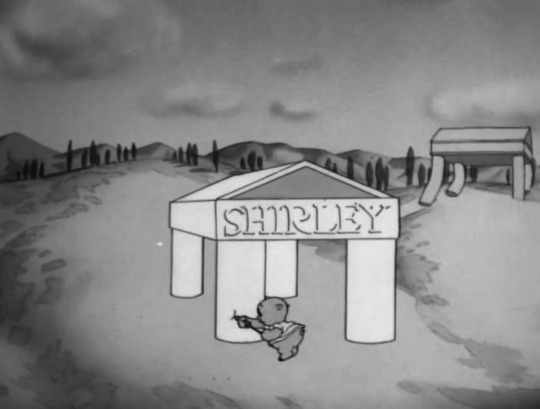
as the gorgon chases porky with her camera, he continues to revive a barrage of statues: the antique, the famed discus thrower (who throws himself out of the scene rather than the discus), the man from the end of the trail statue, who exits riding his horse like a merry go round (a nod to friz freleng’s sweet sioux), a woman who marches off with popeye’s forearms--note the bobe cannon statue in the back here--and a mermaid who unzips her fin and makes a run for it. the highlight of the entire montage is when porky approaches two temples (the two of them together labeled “shirley temple”) and injects the needle into them, prompting the temples to use their pillars as legs and run for the hills.
the chase reaches its climax as the gorgon pursues porky with a movie camera, turning the crank ferociously as she runs. her plan works--porky slows down, freezing in mid-air as the gorgon cries “hold it!” thus, the gorgon pins porky to the ground, who tries his hardest to fight back, but ultimately flailing around as she commands him to open his eyes.

we melt into the present, where we find porky’s mother in place of the gorgon, telling him softly to wake up. he does so, after she pries one of his eyes opens. relieved that it was all a dream, he embraces his mother, prompting a happy end and an iris out.
this cartoon has a soft spot in my heart--it was one of the first LT cartoons i saw on this whole venture. i thought i was the smartest person alive, understanding the three stooges, popeye, and shirley temple references. who knew just how much i had (and still have!) to learn! though even without my sentimental biases, this still stands as a very good cartoon.
as i mentioned previously, the poses in this are full of elasticity and energy, especially in the emperor and the gorgon. porky does a very nice job as well--little pieces of animation such as him fidgeting awkwardly while the emperor rambles on, swinging from side to side as he’s offered the job to be a hero, etc. etc. are full of charm and character. while his personality isn’t the most electric in comparison to characters like bugs and daffy, it’s the little things like these that really make porky stand out. with him, a little subtlety goes a long way, and that’s why he’s one of my favorites. he’s so reserved in comparison to such a wild cast of characters that his timidness actually shines through and sets him apart! (though, on the other hand, he can still have quite the personality, as we’ll discover!)
personally, the only gripes i have with this cartoon is the blackface caricatured assistant (which, in comparison to some cartoons we’ve seen and still have yet to see, is relatively mild, but uncomfortable nonetheless). the jokes, while corny at times, still hit, the animation is full of life and vigor, and the short as a whole has a lot of charm, whimsy, and personality. it has my seal of approval! go check it out!
link!
#lt#porky’s hero agency#clampett#looney tunes#reviews#long post#A REVIEW!!! of one of my favorite cartoons! it's a christmas miracle!#well favorite for this era anyway
25 notes
·
View notes
Text
I Played Cyberpunk 2077
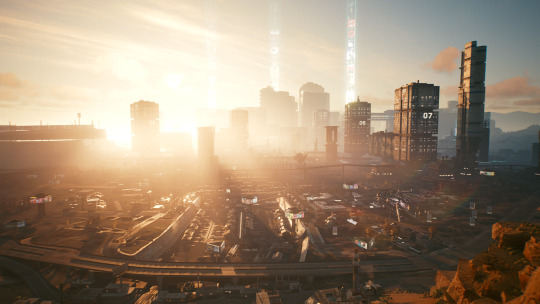
Ultimately, Cyberpunk 2077 is an excellent video game. It’s hard to talk about it without acknowledging the backlash that it received around its launch, but the backlash was directly proportional to the amount of marketing that it got. This happens to a lot of games – and frankly, a lot of my favorite games. If I were working at CD Projekt RED and I was responsible for the kind of marketing that resulted in the kind of expectations that they built for themselves, I’d have to take that sort of stuff into deep consideration. But, as someone who bought the game, enjoyed the game, and desperately wants to talk about the game, I’m not sure that it matters. So, to reiterate: Cyberpunk 2077 is good.
There’s so much game to Cyberpunk that it might be easier to start by talking about my favorite part of it that isn’t a game: the photo mode. I’ve joked before about my favorite gameplay loop in Star Citizen being “taking screenshots,” and that’s not my intent here, but some of my favorite games in recent memory have made it easy to look over the memories I made during their runtime. Interspersed within this review will be some of my favorite screenshots that I took – the inclusion of precise controls for things like depth of field, character posing/positioning, and stickers/frames helped to make my screenshot folder feel less like a collection of moments in a game and more like a scrapbook made during the wildest possible trip to the wildest possible city.
And what a city it is. Night City is my favorite setting in a video game in recent memory. It’s not incredibly difficult to make a large environment, but to make a meaningful environment where every location feels lived-in and the streets are dense with things to see and do? That’s a challenge that very few studios have managed to step up to. More than that, Night City feels unique in the landscape of video game cities – whereas a city like Grand Theft Auto V’s Los Santos is rooted in a reality we’re familiar with, Cyberpunk’s retro-futuristic architecture (and overall aesthetic) help lend it a sensibility that we’re unfamiliar with. It really feels like stepping into another world - fully fleshed-out, fully envisioned.
The environment is obviously beautiful and unique, but I was surprised by just how ornate it was. The thought and consideration that went into details as minor as the UIs you’ll encounter in and on everything from car dashboards to PCs and menus both diegetic and otherwise helps the entire world feel diverse, detailed, and cohesive. While everything feels of a kind and everything is working towards the same design goals, the sheer amount of variety was shocking.
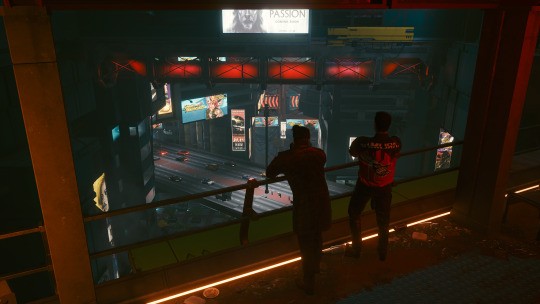
The biggest thing that stuck out to me about Night City itself within just a few hours of playing was how vertically oriented it was. Not just in the “there are tall buildings” sense, though there certainly are tall buildings – I’m talking about the way that Cyberpunk uses verticality to tell stories. The first time that you end up high enough above the skyline to see rooftops will inevitably be during one of your first encounters with Night City’s elite. The hustle and bustle of street life fading away as an elevator climbs up the side of a building and you emerge into a world you aren’t familiar with was astounding. That claustrophobic feeling of being surrounded by monoliths isn’t only alleviated by attending to the rich, though – for similar reasons, my first journey out of the city limits and into the “badlands” will stick with me. Cyberpunk successfully manages its mood and tone by controlling the kind of environments you’ll find yourself in, and while that may seem like a simple, sensible, universal design decision, its consistent application helped ground the world for me in a way that made it feel more real than most of its contemporaries.
Something else that makes Night City feel real is how Cyberpunk implements its setpieces. In a decision that reverberates throughout the rest of the game, CD Projekt was clearly all-in on the notion of immersion and seamless transitions. While it was consistently surprising and exciting to find bombastic moments embedded in the world’s side content (one standout involves Night City’s equivalent of SWAT descending from the sky to stop a robbery in an otherwise non-descript shop downtown), it never took me out of the world. And, on the other end of the experience, the number of memorable, exciting story moments that were located in parts of the city that you had wandered by before helped make the world feel almost fractal, this idea that every building and every corner could house new adventures or heartbreaks.
One thing that did take me out of the experience, unfortunately, were a few of the celebrity (or “celebrity”) cameos. While I think that the core cast was well-cast, with Keanu Reeves as Johnny Silverhand in particular being an inspired choice, the game, unfortunately, wasn’t immune to the tendency to include recognizable faces just because they were recognizable. Grimes plays a role in a forgettable side quest that felt dangerously like it only existed because she wanted to be in the game. There are also an almost concerning number of streamer cameos (“over 50 influencer and streamers from around the world,” according to CD Projekt), and while most of them completely went by me, the few that did hit for me only served to disrupt the world. The only perceived positive here is that most players won’t have any idea who these people are.
Unfortunately, that wasn’t the only thing that broke immersion in the game. Due to what I can only assume are particularly harsh memory restrictions imposed by the game’s release on last-generation hardware, the game has some of the most aggressive NPC culling that I’ve ever seen. While NPCs don’t strictly only exist in screen space, it often feels like they do, as simply spinning the camera around can result in an entirely new crowd existing in place of the old one. This is obviously rough when it comes to maintaining immersion in crowded spaces on-foot, but it gets worse when you’re driving. Driving on an empty road, rotating the camera, and finding that three seconds later there was an entire legion of cars waiting for your camera to discover them, far too close to slow down, was always a deadly surprise. It doesn’t help that your cars take a while to slow down.
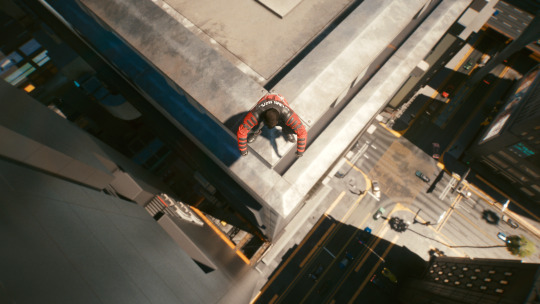
Cyberpunk’s approach towards cars in general is interesting. While I certainly had trouble with them when I began playing, I eventually began to get into their groove. If you want to learn how to drive effectively in Cyberpunk, you have to learn how to drift. After the game’s latest substantial patch, the team at CD Projekt finally fixed my largest problem with the game’s driving – the minimap was simply too zoomed-in, making it difficult to begin to make the right decisions on when and how to turn when traveling at speed. Now that that's resolved, however, whipping and spinning through the streets is fun, and the cars feel appropriately weighty. I’ll still occasionally boot up the game just to cruise around its streets and listen to the radio.
Speaking of the radio, did I mention that Cyberpunk 2077 has one of the greatest game soundtracks that I’ve ever heard? The radio is filled with great original songs from some pretty great musicians, but that’s not where the soundtrack’s beauty starts and it certainly isn’t where it ends. The original soundtrack (composed by P.T. Adamczyk, Marcin Przybylowicz, and Paul Leonard-Morgan) was consistently beautiful, moving, and intense. The world feels gritty and grimy but ultimately beautiful and worth saving, and a great deal of that emotion comes from the soundtrack. While the heavy use of industrial synths could’ve lent itself towards music that existed to set tone instead of form lasting memories with memorable melodies, the sparkling backing tones and inspired instrumentation helped keep me humming some of its tracks for months after last hearing them in-game. I’m no musical critic, I don’t know how much I can say about this soundtrack, so I’ll just reiterate: it’s genuinely incredible.
It certainly helps that the encounters that so many of those tunes are backing up are exciting as well. I was expecting middling combat from the company that brought us The Witcher 3, and while the experience wasn’t perfect, it was competitive with (and, in many ways, better than) the closest games to it than I can point to, Eidos Montreal’s recent Deus Ex titles. Gunplay feels tight, shotguns feel explosive, and encounter spaces are diverse and full of alternate paths and interesting cover. My first playthrough was spent primarily as a stealth-focused gunslinger, using my silenced pistol to cover up the mistakes that my feet made when trying to avoid getting caught. Trying to sneak into, around, and through environments helped emphasize how complex the environments actually were. While it’d be easy to run into a wealth of the game’s content with your guns loaded and ready to fire, that may contribute to a perceived lack of depth in the game’s world design. I’m trying to write this without considering what other people have said about the game, but this particular point has been something of a sticking point for me – there are individual, completely optional buildings in Cyberpunk that have more interesting, considered level design than some entire video games, and the experience of evaluating and utilizing them was consistently mechanically engaging and exciting.
The sheer number of abilities that the player has can be almost overwhelming. While leveling does encourage the player to specialize into certain traits, especially when said traits can also serve as skill checks for the dialogue system and some traversal opportunities, every trait houses a bundle of skills that each house a sprawling leveling tree. Far from the kind of “three-path EXP dump” that you’ll find in a great number of AAA titles, Cyberpunk’s leveling experience can be legitimately intimidating. It’s difficult to plan the kind of character you want to play as when you’re trying to project eighty or a hundred hours forward for a character that will be constantly encountering new kinds of challenges. I certainly didn’t begin my playthrough by wanting to be a stealth-focused gunslinger – in fact, I was originally aiming for a melee-focused hacker build. While I was drawn to what I was drawn to, hearing stories from other players about the kind of builds that they ultimately considered to be overpowered made one thing exceedingly clear: Cyberpunk is a game that rewards every kind of play, possibly to its own detriment.
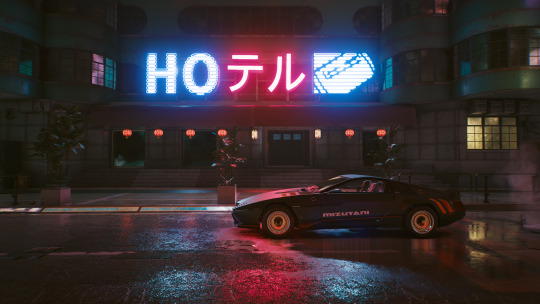
Cyberpunk’s main story is notably short. I wouldn’t consider this to be a problem, considering the sheer amount of engaging, exciting, heartfelt side content, but it might be the core of the difficulty scaling plateauing so early on. As you progress deeper into the game you’ll find that almost every build, as long as you are willing to commit to something, is more than viable. Look around long enough and you’ll find people saying that every single build is overpowered. For me, that fed into the central power fantasy in an exciting way. By the time that I rolled credits a hundred hours in I was more or less unstoppable, walking into rooms and popping every enemy almost instantly. For others, this was a problem – it can be frustrating to feel like all of your work to become stronger wasn’t met with an appropriate challenge when the time came to put it into practice. This is a difficult problem to solve, and I don’t have a solution. I’ll fondly remember my revolver-toting, enemy-obliterating V, though, so I can’t complain.
Regardless of the scaling, however, the content you play through to arrive at that pinnacle of power was consistently, surprisingly robust. While the differentiation between “gigs” and “side quests” is confusing (word for the wise: gigs are generally shorter and more gameplay-centric missions that are designed by CD Projekt’s “open world” team while the side quests are made by the same team that made the main quests and are generally longer and more narrative-centric), both kinds of side content are lovingly crafted and meaningful. Of the 86 gigs in the game, every single one of them takes place in a unique location with a hand-crafted backstory and (almost always) a wealth of different approaches. These don’t exist separately from the rest of the game’s design philosophy, even if they are made by a separate team, and you’ll often find that decisions made outside of gigs will reverberate into them (and, sometimes, the other way around). I’ve played a great deal of open world games, and never before has the “icon-clearing content” felt this lovingly-crafted and interesting. While the main quests will take you traveling across the map, the side content is what really makes it feel dense and real. You’ll be constantly meeting different kinds of people who are facing different kinds of problems – and, hey, occasionally you’ll be meeting someone who has no problem at all, someone who just wants to make your world a little bit brighter.
It’s surprising, then, that one of the most obvious ways to integrate that kind of content in Cyberpunk is so sparsely-utilized. “Braindances,” sensory playback devices used to replicate experiences as disparate as sex, meditation, and murder, play a critical role in some of the game’s larger quests, but they almost never show up in the side content. You would imagine that the ability to freely transport the player into any kind of situation in a lore-friendly way would’ve been a goldmine for side content, but its use is limited. This isn’t even a complaint, really, I’m just genuinely surprised – I wouldn’t be surprised if they used them more heavily in 2077’s expansions or sequels, because they feel like an untapped goldmine.
Another thing that the game surprisingly lacks is the inclusion of more granular subtitle options. While the game does let you choose the important stuff – whether or not you want CD Projekt’s trademark over-the-head subtitles for random NPCs, what language you want the subtitles to be in, what language you want the audio to be in – it doesn’t include something that I��ve grown to consider a standard: the ability to turn on subtitles for foreign languages only. As the kind of player who avoids subtitles when possible, I went through most of Cyberpunk with them off. Unfortunately, a tremendous number of important cutscenes in the game take place in languages other than English, and I didn’t know that I was supposed to understand what these characters were saying until I was embarrassingly far into one of the prologue’s most important scenes.
NOTE: I was pleasantly surprised to discover after replaying the ending of the game earlier today that they've fixed this issue in a patch. Nice!
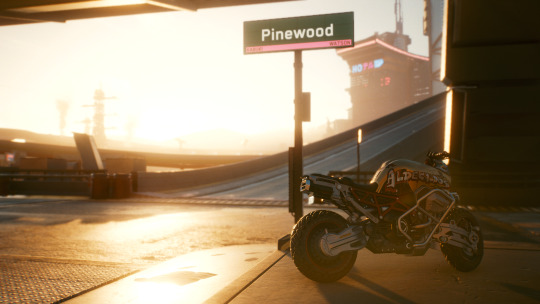
I can only complain about the game’s language support so much, because there’s something important that lies between the player and the story they’re there to experience: a fucking incredible English localization. Ironically, it’s so good that I can’t help but imagine that most players won’t even think about it. It’s easy to notice and talk about an excellent localization when it’s from something like a JRPG, something with a clearly different style from what you’d expect from a work made in English, but never once in my entire playthrough did I even briefly consider the idea that it was natively written in anything other than English. I knew that CD Projekt was a Polish studio, but I just assumed that they wrote in English and localized it backwards. The language is constantly bright and surprising, the jokes land, the characters have memorable quirks, everything feels natural, and the voice acting is legitimately some of the best that I’ve ever heard in a video game. Both versions of the main character’s voice were damn-near instantly iconic for me, landing up there with Commander Shepard in the upper echelon of protagonist VO. I can’t praise it enough.
That said, even if the localization was incredible, it’d be hard to appreciate if the meat of the story wasn’t up-to-snuff. I was ecstatic to discover, then, that Cyberpunk 2077 has an incredible story. Every great story starts with a great cast of characters, and Cyberpunk hit it out of the park with that. The core cast of side characters are some of my favorite characters in years. Judy, Panam, River, and Kerry are all memorable, full, charming people. Kerry Eurodyne in particular is responsible for my favorite scene in a game since the finale of Final Fantasy XV. The quest “Boat Drinks,” the finale of Kerry’s quest line, is quietly emotional and intensely beautiful. He, and the other characters like him, are more than the setting they’re in, and the way that the game slowly chews away at the harsh and bitter exterior that the world has given them as it reaches to their emotional, empathetic core consistently astounds. Night City is a city full of noise, violence, destruction, and decay, but you don’t have to participate in it. You don’t have to make it worse. You can be different, and you can be better. You don’t get there alone, you can’t get there alone, and Cyberpunk is a game that revels in how beautiful the world can be if we are willing to find the light and excitement in the people around us.
Of course, Cyberpunk is a video game, it’s an RPG, and the story is more than a linear progression of memorable moments. Something that struck me while making my way through Cyberpunk’s story was how expertly and tastefully it implemented choice. I’m used to games that give you flashing notifications and blaring alarms whenever you're able to make a decision that matters, so I was initially confused by how Cyberpunk didn’t seem reactive to the things I said and did. The game would give me a few options in conversations, I’d select one of them, and then the story would progress naturally. However, as I continued, I began to notice small things. One character would remember me here, a specific thing I said twenty hours before would be brought up by someone there, an action that I didn’t even know I had the choice to not take was rewarded. The game slowly but surely established a credibility to its choices, a weight to your words, this sense that everything that you were saying, even beyond the tense setpiece moments that you’d expect to matter, would matter. It was only after going online after completing the game that I realized just how different my playthrough could’ve been. While nothing ever reached the level of the kind of divergent choices that The Witcher 2 allowed, there were still large chunks of the game that are entirely missable. Three of the game’s endings can only be unlocked through the completion of (and, in one case, specific actions in) specific quests, and multiple memorable quests were similarly locked behind considerate play. This isn’t really a game that will stop you from doing one thing because you chose to do something else, most of the choice-recognition is simply unlocking new options for the player to take, but it always feels natural and never feels like a game providing you an arbitrary fork in the road just for the sake of making it feel artificially replayable. CD Projekt has already said that they made the choices too subtle in Cyberpunk, but I deeply appreciate the game as it is now – more games should make choices feel more real.
It helps that the dialogue system backing up some of those choices is dynamic and the cutscene direction backing those scenes up is consistently thrilling. The decision to lock you in first-person for the entire game was an inspired one, and it resulted in a bevy of memorable scenes made possible by those interlocking systems. There are the obvious ones – being locked in a smoky car with a skeptical fixer, getting held at gunpoint by a mechanical gangster with his red eyes inches away from your own and a pistol’s barrel just barely visible as it presses against your forehead, having to choose between firing your weapon and talking down someone with a hostage when in a tense, escalating situation. There are also a million smaller ones, situations where the scale of the world becomes part of the magic. The first time that I sat down in a diner and talked with someone I had to meet or the first time that I rode along through the bustling downtown of Night City as a politician sized me up will stick with me because the perspective of the camera and the pacing of the real-time dialogue interface combine to make almost everything more powerful. There’s so much effort put into it – so many custom animations, so many small touches that you’d only see if you were staring intensely at every frame. All of that effort paid off, and the controversial decision to strip third-person out of the game was ultimately proven to be one of the smartest decisions that CD Projekt has ever made.
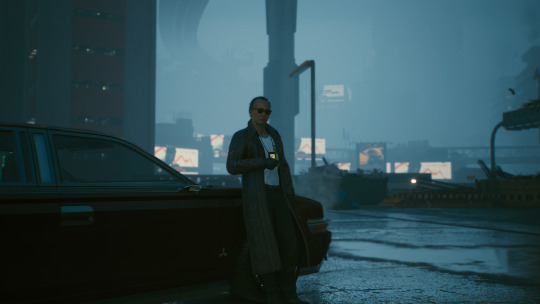
Another decision that helped power an exciting, engaging story was how the game freely manipulates the time and weather during key story moments. It’s a small touch, it’s one that you won’t notice unless you’re looking for it, but every once in a while you’ll walk into a place during a crystal-clear day and come out five minutes later to discover that it’s a cold, windy, rainy night and you have a city to burn. Along with the first-person limitation, this initially feels like something that could only harm immersion, but when it’s backed up by a story that motivating and scenes that thrilling you’d be hard-pressed to notice it outside of the flashes of telling yourself that this scene or that scene is the best that you’ve played in a long time. This also helps avoid a problem that games like the Grand Theft Auto series consistently face – instead of letting scenes happen at any time, compromising direction, or doing something like a timelapse, sacrificing immersion, Cyberpunk manages to always keep you in the action while also presenting the action in its most beautiful and appropriate form. There are moments where it truly feels like it’s meshing the kind of scene direction that’d be at home in a Naughty Dog game, the gameplay of Deus Ex, and the storytelling of the WRPG greats, and in those moments there is nothing else on the market that feels quite like it.
I sure have talked a lot about this game’s story, considering the fact that I have barely brought up its central hook. The early twist (unfortunately spoiled by the game’s marketing), the placement of a rockstar-turned-terrorist-turned-AI-construct firmly in your brain after a heist goes wrong and your best friend dies, helps establish a tone that the rest of the game commits to. Johnny Silverhand starts as an annoying, self-centered asshole with no real appreciation for how dire your situation is, but by the end of the game he had more than won me over. Reeves’s performance was really stellar, and the relationship between him and V is incredibly well-written. More than that, his introduction helps spur on a shift in the way that you engage with the world. The first act is full of hope, aspiration, the belief that you can get to the top if you hustle hard enough and believe. After you hold your dying friend in your arms and are forced to look your own death in the eyes, though, things begin to turn. Maybe the world is fucked up, maybe it’s fucked up beyond belief. But there Johnny is, telling you to fight. Why? Every time you fight, things get worse.
But the game continues to ruminate on this, it continues to put you in situations where fighting not only fails to fix the problem, but it makes it worse. Despite that, it’s positive. For me, at least, Cyberpunk’s worldview slowly came into alignment, and it’s one that I can’t help but love. Cyberpunk 2077 is a game about how important the fight is, how important believing in something is, even if you’re facing impossible odds, even if there’s no happy ending. It’s a story that posits that giving up is the worst ending of all, that your only responsibility is to what’s right and to the ideals that you and the people you love want to live up to. The game uses every story it can tell, every character it can introduce you to, and every encounter it can spin into a narrative to drive that home. And, when the ending comes, it was phenomenal. All of the endings were powerful, effective, and meaningful to me, but I’m more than happy that I went with what I did.
Cyberpunk 2077 is an excellent video game. It’s not flawless, but no game is, and at its core it's one of the most fun, beautiful, narratively engaging, and heart-filled games that I’ve ever played. I couldn’t recommend it highly enough, and I sincerely hope that everyone who has skipped out on it because of what they’ve heard is able to give it a shot someday. Maybe they’ll love it as much as I do. Wouldn’t that be something?
3 notes
·
View notes
Text
Waiting for the Worms
Prologue- part 1?
Read this first:
This story contains graphic depictions on drug use implying overdose, child neglect, starvation, outright violence and major character death.
Possible future chapters will include trauma, grave digging, claustrophobia, murder, emotional manipulation, and child abuse. Will add more if they occur.
Please take of yourself and avoid this if you have any of these triggers, this fic is going to be a Lot of angst before anything gets even remotely better.
~---~
The first time they switched, it only happened for a minute. Whatever magic in the universe that created the soulmate connection was benevolent enough to wait until the younger of any pair turned six before a first switch could occur. Just old enough to be able to speak and communicate with the world around them, but young enough to establish a fast bond. Of course, the first few swaps were always quick. Just enough to let you know your other half was out there and alive without adding unnecessary mental strain from such a new experience.
Marinette had only turned six just that morning when she came to in a boy's body, standing in a bathroom and looking down at a woman slumped in the bathtub, needle sticking out of her arm. She couldn't process what she was seeing, not really. Only doctors and nurses used needles, and they never left them in, so why did this lady have one? Did the nurse forget it there and she was too afraid to take it out herself? That's okay, Marinette was brave. She'd take it out for her.
Leaning over to grab the end of it, she blacked out only to awaken sitting up in her bed. Blinking back the confusion, she ran downstairs to tell her parents what she experienced, leaving out the woman with the needle. Her mama and papa needn't worry. She's sure the lady would be just fine once whoever that boy she woke up as took it out.
…
It took three years for a swap to last more than a few minutes for her. Her parents assured her that this was normal and the switches with her soulmate would get longer once they were both a little older, usually around ten. This time, it lasted over an hour. She was only nine and quite proud to be considered strong enough to hold a connection earlier than average.
Only, she woke up in an abandoned building.
This couldn't be right, he was in a home last time and that was only a few months ago. Maybe her soulmate just got lost and decided to take shelter for a while? The gnawing hunger said otherwise. Lifting her shirt, she could see the outline of her ribs and began to understand. This wasn't a mistake. He must've been starving for quite a while to be so thin. That much, she realized on her own. The pain of hunger struck up again and she felt tears well up in her eyes, not only for the tightness in her stomach, but for the misery of her poor soulmate.
When the pull to switch started to tug at her mind, she resisted, hoping the boy would go and eat with her family. It was almost dinner time and he deserved a real meal, even if it wouldn't transfer with him when he reentered his body. She prayed with all her might that at least this would offer him some small comfort. Surely he felt the tug too and knew she was holding back for him.
Marinette wished she could leave some sort of note, but upon scavenging the backpack she finally noticed beside her, she found it filled with only necessities. She couldn't fault him for that. His survival was more important.
Her strength wilting, she knew she'd let go soon, her last thought a hope that he enjoyed his time as her.
Coming back to her own body, she carefully hid any reaction and resolved not to tell her parents, not wanting them to know the horrible truth. For what could they do? They didn't know the boy's name, where he lived, or even how to find him. And if the sounds and words she had heard in the last few switches were anything to go off of, he wouldn't speak French either.
Based on her parents' behavior, they hadn't noticed. Perhaps they just thought she was feeling a little down and didn't want to talk. That was fine by her.
…
When she turned 12, something changed. Marinette had grown accustomed to waking in random places hungry, sore, and cold. Over time, the hunger was less, so surely he found some reliable source of food even if it wasn't enough to curb the ever present twist in his lower gut. He also seemed stronger over time, little bruises and scars starting to accumulate from what she could only assume were street fights. She considered herself lucky the swap never occurred during one of those.
This however? Was completely different. Enough to give you whiplash.
She found herself in a soft bed with plush blankets and down pillows, the room surrounding equally as lavish. For a moment she wondered if perchance they had a third soulmate who was much younger than them, but looking down at herself, the frame and scars and structure were all the same.
Not sure how to behave in this new environment, she simply sat there, unmoving, until a nagging in the back of her mind told her to check the drawer of the side table next to her.
Reaching in, she found a crisp, folded up piece of paper with her name scrawled across the top. A note from her soulmate. Opening it up, she thanked everything she had that she realized he probably spoke english three years ago and began studying it extensively. Reading his letter was slow going and took multiple tries, but she eventually figured out the jist of it even if she was clearly missing some of the more obscure words and proper conjugations.
He was thirteen and had been taken in by a man of wealth, Bruce Wayne. This was home now. She would wake up and not be homeless now. He was sorry. Something about her deserving better. His name was Jason. He was very sorry. A man named Alfred was a good person and trustworthy. She would like him. He hoped she liked him.
The letter, as convoluted and confusing as it was at times, broke her heart.
Shuffling through the drawer, she pulled out a notebook and opened it to a random page and grabbed a pen. She was embarrassed to say that her note was probably more confusing with its broken english, but there was no way he learned French while living on the streets, so she did her best to let him know that he shouldn't apologize. He had no control over his situation and that she hoped he found some reprieve in his time in her body. That she cared and was so very happy for him to have found a home. That it was wonderful to know he would sleep in such comfort with a full stomach and a warm blanket and people who cared for him keeping him safe. That he deserved to be happy and thrive without the fear of where he would sleep that night, when his next meal would be. That she was happy to be his soulmate, no matter what.
…
After that, they switched more sporadically. She learned that muscle memory was an amazing thing. Nothing quite like coming to while sparing with a full grown man. And not realizing that it was a spar and not some man trying to actually take down her soulmate.
The next time they switched, she found a note with profuse apologies and a brief explanation as to what was happening. That was how she began her training with him. She asked her Maman about getting into martial arts so she could keep up with him and continue his training if he got stuck in her body for more than a few hours.
Obviously her parents knew she had a soulmate and presumably his new parental figures knew he did too, but they made sure none of them could ever tell when a switch occurred. Letters were made detailing their usual reactions and attitudes and way of doing things. Letters were burnt to never be seen by another's eyes. Instinct is what helped them the most to hide their secrets. While Marinette had always been a generally open and honest kid, this was between the two of them and no one else needed to know their business. Especially with his new role as a vigilante in training.
…
When she turned thirteen, that training took a new meaning for them both. He had been Robin for half a year at this point, with only minimal switches during actual patrols, when she received Tikki.
Directly after defeating Stonehenge, she wrote out a long winded letter in near perfect english- written grammar rules would forever confuse her- to him despite his immense progress with French and placed it in a secure lock box they used in her home for communicating and instructed Tikki that upon sensing their switch as the magic being assured she could, to stay hidden until he finished reading it in its entirety.
Of course things don't work out that simply and they switch in the middle of an akuma attack. Looking back on the footage, muscle memory once again saved their lives, but she still feels horribly about how he got tossed into it. Tikki assures her that he was okay and read her note and wasn't angry with her. That she had been forced into this position in both their lives now, yes, but not at her.
She could only count her blessings that they both already had a background in fighting at this point. If her mentor took note of her easy transition into superheroism, it was easily chalked up to her martial arts classes, even if she had only been in them for about a year. If his mentor noticed his increased agility and critical thinking due to his time in her body fighting akumas and using convoluted lucky charms, he likely assumed it was his own guidance finally taking hold.
…
The last time they switched, Marinette was fourteen and in class. It was first thing in the morning, attendance already taken and lessons underway. By all accounts, Jason should have been asleep, what with it being around two a.m. in Gotham. Switching at this time wasn't unheard of though considering their lifestyles, so upon feeling the small tug in her mind that let her know she was about to be somewhere else, Marinette placed her tablet down and leaned back in her seat so he wouldn't accidently draw attention by tossing the tablet or falling back upon waking as her. Then she waited.
The first thing her disoriented mind picked up was the feeling of a metal bar launching into her stomach which… admittedly wasn't an entirely new feeling, though it usually occurred in her own body and not through his.
Okay, so a fight, she could handle this.
Her arms wouldn't move though.
They were strapped down, as were her legs and the metal was pulling itself away from her. So she wasn't launched into a steel bar or batted across the city. This was purposeful, she thought as the bar slammed into her stomach once more, erupting in pain without the protection of a magical suit. Despite the fear now coursing through her, she opened her eyes.
Or rather, attempted to.
One was swollen shut and as she became more aware, she could feel broken ribs, a broken leg and arm, the pulsing of half her face. As her one good eye opened, the room spun, but she could see a man in a swirl of purple and green standing over her body. Her soulmate's body. As soon as the world stopped, she came to focus just in time to see a crowbar swing down into her throat, cracking the windpipe. As she struggled for breath, the tugging came to the back of her mind once more, the strain on his body too much to hold her mind in place.
She pushed it back, focusing more on forcing him back into her mind than breathing at this point, ignoring the blows raining down on her.
She was numb by now anyways.
She could feel Jason trying to claw his way back, pushing against her will to switch back, but at this point, this body wasn't strong enough to allow a switch. She was stuck in him and he in her. Good. Jason had been through enough. She could endure this for him.
Distantly, she noticed the beating had stopped. Hopefully that meant Batman was here now and would take her away from this place. To a hospital or even to their personal surgeon, whatever their name was, she could never remember. It'd be over soon and she could rest through the pain until Jason's body was healed. Then they could switch back. When the pain was but a distant memory.
Smiling to herself at the thought, she managed a tiny smile, not hearing the explosions in the background until the flames were upon her.
And then she was gone.
#ml x dc#jasonette#maribat#please read the warnings#this is really dark#still only on mobile so no keep reading option that i know of#WFTW#part 1
623 notes
·
View notes
Text
THE YEAR IS 2020 AND I WATCHED NEON GENESIS EVANGELION FOR THE FIRST TIME, PART 13
Episode 25.
I spend twenty minutes after the episode ends trying to articulate what I think happened to my friends, gesticulating wildly.
The episode starts with a condensed version of the last upsetting bits of the previous episode and thus sets the ground for my difficulty in expressing my thoughts on it because of the imperfect intersection of linear narrative and metaphorical examination of selfhood. I've been trying to follow the show as a narrative, even as things dissolve, but here everything just goes STOP NO CONTEXT JUST IDEA AND INTERNAL INTERROGATION which I think I follow but I have difficulty following WHILE ALSO thinking about giant robots.
Something bad happened after the events of the last episode and maybe in the overall narrative structure that's all that matters? I guess this episode is about the question of what the end goals of all the barely understood players are vis-à-vis humanity through Shinji et al.
How can we be our fullest self? What and who informs who that self is? The passive approach, as seen in Shinji, isn't it. You cannot only do what you are directly told to do and you can't intuit what other people want you to do as unspoken directions.
The isolationist approach, as seen in Asuka, isn't it, either. Trying to act and live above and without human connections or direction has made her sense of self the most fragile. She's just a shell projecting an ideal around a core of hatred.
Misato is there as, perhaps, the end result of trying to live life like Shinji into adulthood (the result of Asuka's approach is evident because she's shattered), a projected false self created to fulfill the outside expectations of others while the inner self gets lost.
Rei I feel is the one who is closest to having it 'right' insomuch as there can be a right way to be a human being (and perhaps part of what Evangelion and its characters are grappling with is that there isn't or if there is, it's not a simple thing). She recognizes that who Rei is is shaped by Rei's interactions with other people and the passage of time and I think that Rei 3's apparent rejection or turn on Gendo's influence is because she knows that's not the entirety of it. Everyone is confronted to some degree by the fact that the version of themselves seen by other people is flawed but in Rei's case she's able to know it in a profound way because she is aware of the previous Reis and their memories but also of herself as distinct from them. So Shinji knows her but he doesn't Know Her and much of what Rei knows of others is removed, the Rei deaths and recreations putting a barrier between a direct human connection. The human connection is key but perhaps the degree to which so much of it is abstracted in Rei is why she isn't fully emotionally engaged as a person, even when her understanding of personhood is so much fuller than the others. No human connection leads to Asuka: fragile and quickly destroyed. Shinji recognizes the importance of the human connection, maybe, but fails to enact the how and in its place he has the projections of what he thinks other people want guiding him.
The people in our hearts aren't real people but just manifestations of our self speaking through puppets that look like people we know and can't substitute for human connection and create a similarly false self for the benefit of the false people projections (Misato).
Shinji's fear of being hurt by human connections results in his inability to make human connections and his holding himself up to the standards of imagined human connections which are unsatisfying and disappointing to everyone, including him.
Gendo's Human Instrumentality Project seems to be about recognizing the need for human connections, specifically individuals filling needs for each other that cannot be filled by the individual alone, both for the pursuit of fulfilling the need to find the true self but also taking humanity beyond humanity. I think it's because Gendo has sublimated his grief and sense of loss with respect to his wife into viewing the ability of individuals to obtain fulfillment and then lose it as a weakness that can be overcome.
If all of humanity loses its individuality and turns into the orange tang all humans are always complete and cannot be made incomplete by losing part of themselves. This is too much connection and gross, indistinguishable. What is the point of this if there is no individual?
Right now it looks like all approaches are imperfect and lead to failure, certainly in the context of Evangelion and these characters.
Visually everything is very cool in this episode even though the budget limitations are obvious. The work arounds are creative and inform the substance of what's being said, I think? There's distortion and dissolving and isolated figures on foldout chairs under spotlights.
My favourite thing is how the false characters, the characters talking to the real characters in the chair, are clearly drawn differently, badly, off model. Something is done to indicate their lack of realness, especially the false Shinji in Misato's heart.
I'm sorry if this commentary has become increasingly boring, I'm sorry if I'm doing or talking about Evangelion wrong or badly or pointlessly. I've really enjoyed it. This concludes my report on the penultimate episode of Neon Genesis Evangelion.
The final episode behind the cut.
Episode 26.
I appreciate the honesty of opening the episode with text that basically announces "look we don't have the time to explain everything so we're just going to explain it as it pertains to this microcosm called Shinji". It's a very clever/honest sort of meta acknowledgement of MAN THE BUDGET OOPS but I feel it's also in a way of framing the psychological aspect of the narrative as something that is not unique to Shinji but Shinji is merely the lens through which something more universal is viewed.
The episode seems to be divided into four distinct sections. The first bit is a ramped up version of the meditative internal discussions that have become increasingly frequent during the series. Interrogation by on screen text asking questions like are you happy, why aren't you happy, what do you want, why do you want this, why do you do that ... some of them very basic therapy sort of questions, others being refinements of that, questions meant to prompt you to look inward for an answer only you have.
But although we're told that this is an examination of Shinji sometimes Asuka is answering, sometimes Rei is answering. Sometimes they're asking the questions. Sometimes other characters are asking or elaborating, unseen.
Previously I've talked about feeling like narrative-wise things have been dissolving, when I try to recall a sequence of events, but here what's dissolving is the distinction between the characters because the experiences are unique but the feelings are inherently universal.
There's a lot of different things going on here, visually. Still portraits, reused footage from previous episodes, repeated shots of a rotary phone with the cable cut really sticks in my mind for some reason, what seem to be actual black and white photos of contemporary Japan. There's a universal quality and it's also how everything around you, all the people and experiences, make up the you that you are, shown with an outline of Shinji that's filled with rapidly flashing poorly imposed images of others that don't fit in his outline. It's cool.
That's when the episode transitions to its second bit which is, like, I don't know. It's a bit student film, it's a bit like that Loony Toons bit where Daffy Duck is talking directly to the animator who can erase and redraw him at will. It's barely animated in parts.
I had this understanding that Evangelion ran out of money near the end and that the last episode was barely animated at all and I think I assumed it would be like how I understand the second disc of Xenogears to be, just ... text because we can't do assets? But it's not. It's unpolished and sketchy and minimal, in spots just pencil drawings or roughly coloured in with markers, at one point it's just wave forms? But it was sad and weirdly beautiful and it felt like an extension of Shinji's internal struggle for meaning and understanding. Maybe because the lack of budget gives it an aesthetic similar to a student or art school film, it informs the material with a sincerity that I feel would be lacking in a more polished, traditional product. The fewer hands that can be felt in something the more /authentic/ it feels.
I, at least, have a greater patience and a great appreciation for something when I feel an authentic quality from it, even though that's only my perception. Form and substance compliment each other here, even if it's just because of budget constraints.
There's a really good part where it's just Shinji in a white void and it's, you know, about how that's the safest because there's nothing constraining him because he's the only thing, but it feels empty because how do we know what we are if we have no references. So a horizontal line is drawn and that's the ground in this white void and Shinji is then standing on the ground and it's reassuring, it's a reality that simultaneously limits your options but in limiting them defines what they are. It's just ... good.
Once things have been completely broken down it's time to I think reassemble them and that's the third part of the episode where Shinji wakes up in an otoge game where everything is good and normal and Asuka's his childhood friend, his mother is alive (but still faceless) and his father ... also exists and is not being actively cruel but hidden behind a newspaper, similarly faceless, existing but known (he's at the table, Yui is in the kitchen with her back always to the camera), Misato's his hot teacher, Rei is the new transfer student ... There's running to school with toast in mouth (from otoge Rei). Shinji's just a Normal Teen (but the normalcy is false, this weird artificial hyper normalcy that contrasts with the sad, raw realness of Shinji's life in Tokyo 3).
That's on the stage that Shinji is watching from his stool in the empty gymnasium with Misato and it goes dark and it's like ... this is another reality but I don't think it's meant to be a quantum thing but an example of the potential of, like, /imagine/ a you who is happy. So this is the fourth part of the episode and it's characters, every single character, interrogating Shinji, pointing out Shinji's flaws, and giving him ... advice? Guidance? A lot of it is ... bad. The characters recognize real problems Shinji has, that Shinji knows he has and then they tell him things which are presented as, for lack of a better term, 'solutions' to his problems of self. But a lot of them are not actionable. Some of them are little more than 'you hate yourself but have you considered ... not hating yourself?'
Much like when Shinji gets praised, once, by his father for what he did in the robot and that is assumed to be good because it's good in comparison to the nothing he's received, the words Shinji gets here are presumed good because they're actual acknowledgement of his problems.
The result is Shinji standing on the earth, surrounded by the other characters, announcing that he is determined to care for himself, and they all applaud and congratulate him and it's weird. It's presented as happy but there's no emotion. No emotion in this climax of a series that has so effectively evoked so much emotion, raw and powerful and real and relatable. It's not happy. It's not sad, either. It's just an absence of sadness. It's this orange tang safety in muted absence of loneliness or danger. I think because Shinji is given good conclusions for his problems (self-worth and love have to come from within, you need to allow yourself to care for yourself or you'll never believe completely that others can care for you) but he's not shown a good path to get there. What people tell Shinji gives him an understanding of what the goal is (happiness) but none of the tools to get him to happiness, something he has no real personal experience with, so the ending he arrives at isn't authentic. It's a false construct, like the otoge realty.
It's not a good ending but I think it wants there to be a good ending and the viewer to recognize when a 'good' ending isn't really good. It's a lot to think about. This concludes my report on the final episode of Neon Genesis Evangelion.
3 notes
·
View notes